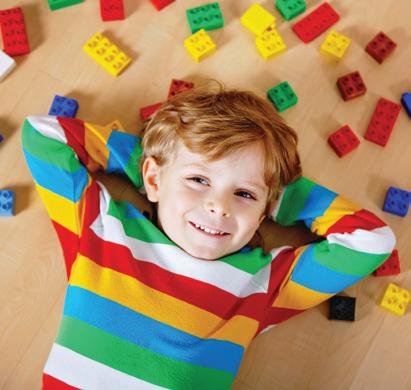
















hen you choose Pearson Edexcel, you are choosing a high-quality, modern British international curriculum, with a proven heritage. Renowned for their academic excellence, our globally recognised qualifications provide a passport to the most prestigious universities around the world.
• Pearson has over 150 years of experience as a British examination board
• Originally University of London Examinations, our first exams were awarded in 1905
• Pearson is the largest examination board in the UK
• More than 3,4 million students take Pearson qualifications annually

• Pearson qualifications include International GCSE and A Levels
• Our qualifications are more closely aligned to the British national curriculum than other international exam boards
• Recognised by the world’s most prestigious universities
• Recognised by Universities South Africa for foreign matric exemption
Our International A Levels use the popular and flexible modular approach which means exams are taken at the end of each unit of study, or throughout the programme of study when students feel prepared and ready!
Pearson International A Level Science examinations are paper-based, meaning you don’t need to search for an approved lab for your child’s Science examinations!
We provide more transparency and support – Pearson is the only UK exam board to offer free access to scripts via our exam centres. Our #examsspelledout videos explain different aspects of the exam process as part of our post-results support for students and parents.
“We really like that the Pearson Edexcel curriculum encourages (our daughter) and teaches her how to think, not what to think. It has revealed her own character, which prepares her for what might lie ahead.” – Mother of Denise, International GCSE student, Potterhouse School, Kenya
“With Pearson Edexcel International A levels, I can literally do anything. You can study in hundreds of countries and it always counts… I have British A levels!” – Malenka, Pearson Edexcel A Level student at Academia International School in Zurich
Find out more from our Guide for Parents and Learners or reach out to Christine.Evans@pearson.com.
10

Homeschooling doesn’t have to be an overwhelming or stressful process. We’ve rounded up the top eight things homeschool parents can do to help them on their journey.
How to ace an exam Exam season can be an incredibly stressful time for all students, especially with the weight of expectations in these economically challenging times.
Reacting the right way to grades It’s nearing the time when you experience stress about your child’s end-of-year results. Perhaps your child’s results weren’t quite what you expected?

You know your child and you know that they’re capable of achieving much more. Here are some suggestions to help you respond constructively.
18
Ask Dalena Dalena van der Westhuizen will answer any questions or concerns you may have about learning, concentration, memory and cognitive development – and, of course, the frustrations arising from these.
20
These days, almost all teenagers and even younger children have access to the Internet or a smartphone. However, with the privilege of technology come several dangers. Get tech-wise!

How to foster your child’s self-esteem
Self-esteem is one of the most important charac teristics of healthy child development. A child’s social, behavioural and emotional health plays a crucial role in how they handle setbacks, peer pressure and other challenges throughout their life.
Genius ways to keep kids entertained on a car journey
If you’re travelling with your family this December, we have eight top tips to keep kids of any age entertained on the road.

Going away this December holiday? The best part of a holiday road trip is the delicious padkos you nibble during the journey.
Fun local events and outdoor activities in your city and nearby places for the whole family.
Teach children to grow their own food
Having a vegetable garden can be a fun and easy way to keep the whole family healthy. And when you all grow the fruits and vegetables together, everyone’s more likely to be excited about eating the produce they helped grow!
A new phenomenon in racquet sport
Described as “tennis with walls” or “squash in the sun”, padel tennis is one of the fastestgrowing sports in the world. It’s super-fun and great for all ages.
Student accommodation: what are the options?
From university residences to private accommodation or living at home, there are many options available for prospective students. What type of independent living will suit your child best next year?
A growth mindset What exactly is a growth mindset? And what’s the hype all about?
Holiday boredombusters for the whole family
Beat the boredom and exercise minds with our Local is Lekker word search and Sudoku.
Being a mom is one of the most exciting and rewarding jobs in the world. However, it can also be one of the most exhausting. People say being a mom is a full-time job, right? Wrong! It’s actually the equivalent of two-and-a-half full-time jobs, according to a 2018 study from American juice company Welch. The study found working moms clock an average of 98 hours per week.
As a mother of three, I know how easy it is to get caught up in the cycle of kids, work and keeping house, and one of the first casualties is usually solo time to recharge.
With the end of the year fast approaching, I hope every mom who’s put the needs of everyone in her family before her own throughout the year has made a list of self-care activities for the holiday season.
And if you feel guilty about putting a self-care list together, know that taking care of yourself isn’t a luxury – it’s an essential part of being a good parent. Old-fashioned guilt prevents many mothers from taking advantage of me-time. After all, what kind of mom puts her own needs ahead of her kids’? A pretty good one, actually. That’s because before we can care for our children, we need to nurture ourselves.
Self-care doesn’t necessarily mean manicures and pedicures. It could mean that, but purely as a restorative
which helps you feel like yourself and brings you back to who you know yourself to be, especially after a busy year. It could be manicures and pedicures for some; for others, it could be exercising, reading or connecting with friends.
If you already have a busy December holiday planned, make sure you squeeze in some time for self-care – even if it starts with only five minutes. Holidays are necessary for kids to recuperate after a season of work. They’re also a chance for their minds to rest and have fun – and the same goes for moms.
While the best part of any holiday is spending time with your loved ones, remember to schedule some time just for yourself. The more we fill ourselves up, the more we have to give. And as moms, we have to give a lot.
Publishing Director/Editor-in-Chief
Jason Aarons | jason@isikhova.co.za
Editor Adri Viviers | adri@isikhova.co.za
Managing Director Imraan Mahomed imraan@isikhova.co.za
Director: Brand Strategy Jenny Justus jenny@isikhova.co.za | 083 450 6052

Creative Director Joanne Brook joanne@isikhova.co.za
Operations Director Thuli Majola thuli@isikhova.co.za
Copy Editor Anne Phillips Media Specialist Ruwayda Mahomed
ruwayda@isikhova.co.za | 072 383 3203
Recognised as a homeschooling stakeholder by the Department of Basic Education
Officially endorsed by CNA as its preferred homeschooling media partner
Subscriptions & General Enquiries: sahomeschooling@isikhova.co.za
SA Homeschooling magazine is independently published by Isikhova Media (Pty) Ltd, 10th Floor, Metal Box, 25 Owl St, Milpark, Johannesburg, 2193, South Africa Tel: 011 883 4627 | www.isikhova.co.za
Find us on Facebook and Instagram
The views expressed in this publication are not necessarily those of the owners, the publisher, contributors or their agents. While every effort has been made to ensure the accuracy of its contents, neither SA Homeschooling magazine, the owners, the editor, the publisher, media alliance partners nor any of its endorsed organisations or contributors can be held responsible for any omissions or errors; or for any misfortune, injury or damages which may arise therefrom. The same applies to all advertising. SA Homeschooling magazine © 2022. All rights reserved. No part of this magazine may be reproduced without prior written permission from the publishers.


Homeschooling doesn’t have to be an overwhelming or stressful process in the least. To help make the transition a little easier, we’ve rounded up the top eight things parents can do to help homeschoolers on their journey

2They don’t fall into the comparison trap.
If parents are comparing their homeschool with a traditional educational setting, they may be causing their families to miss out on the advantages homeschooling offers. Consider the reasons you chose homeschooling over a public or private school. That will probably leave you wondering why you’re still trying to emulate that model of education or using it as the plumb line for how your homeschool should operate.
If parents are comparing their homeschools with those of other homeschooling families, they’re also missing out on creating their own unique homeschool setting.
They research their homeschool options.

Some parents find that the third quarter of a school year is an opportune period in which to start their research because it gives them enough time to investigate the details and get started by the new academic year.
Subscribe to magazines such as SA Homeschooling and Beyond, visit the library, read books and talk to people who homeschool. Educating yourself about the various routes you can take is the best way to define why you’re making this decision and what you hope homeschooling will accomplish for your family.
Different families have different needs and children have a variety of talents and academic strengths and weaknesses.
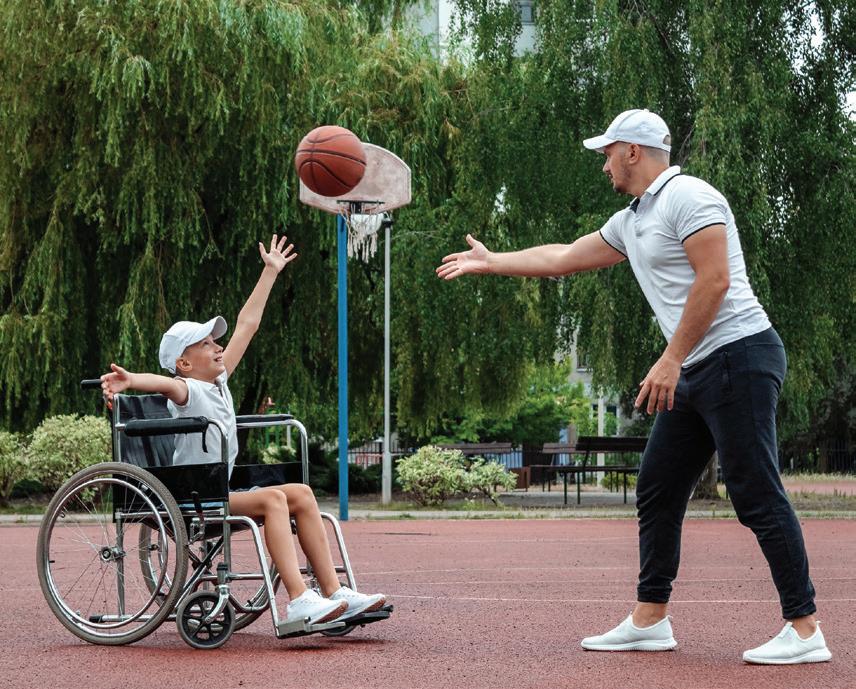
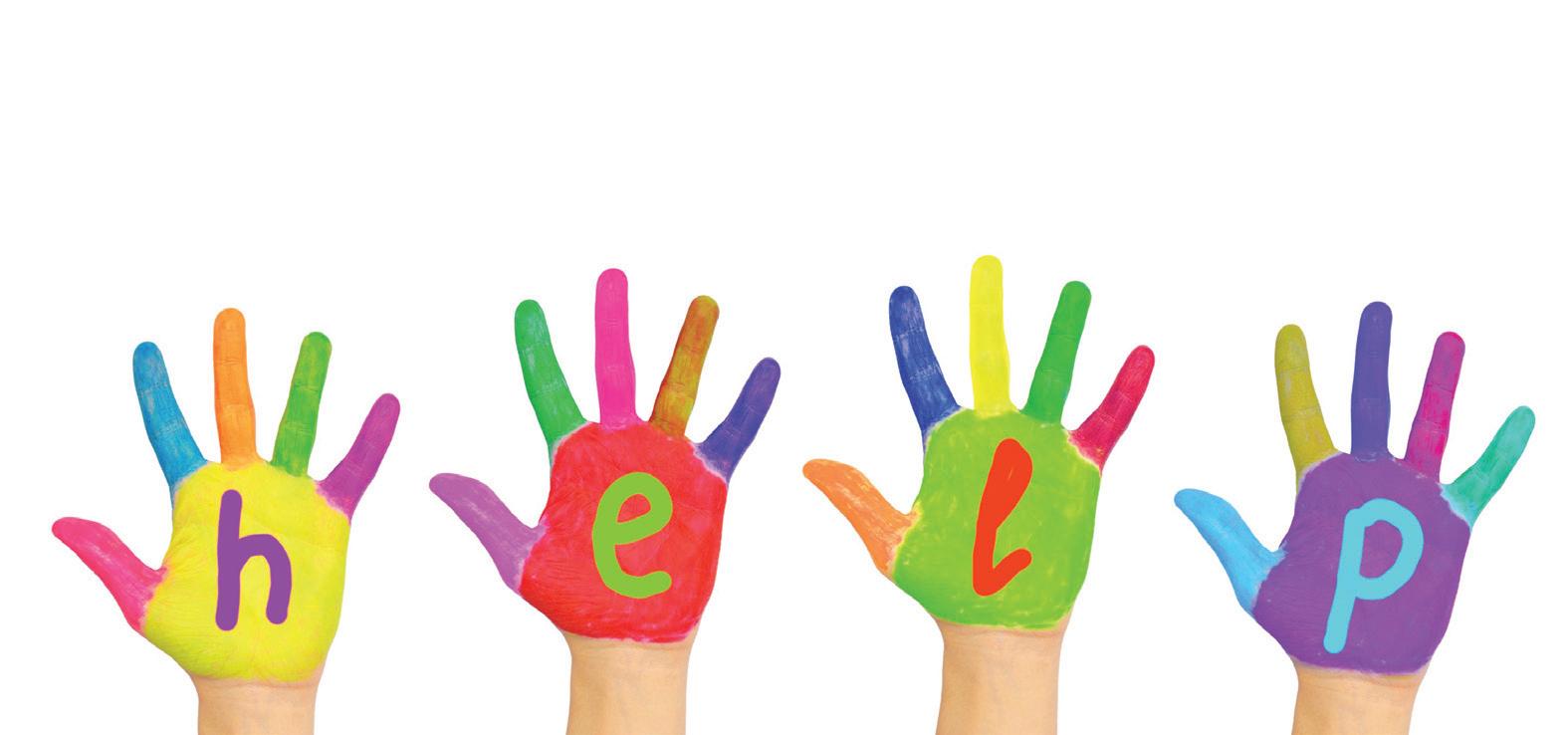
3They institute a lifestyle of learning. Any successful homeschool family will tell you that learning doesn’t stop outside “school hours”. Being a homeschool parent means you’re always teaching. These parents instil a love of learning in their children that will take them far beyond a diploma or degree.
They join a local homeschooling group. Meeting homeschoolers in your area will net you valuable information. Here you’ll find other families who can answer questions, let you review their at-home teaching habits and show you how homeschooling works for them. You can learn about age-appropriate activities in which your children may want to participate, such as sports, tutoring, or small clubs that suit your kids’ interests. During weekly meetings, parents may opt to teach a subject such as a foreign language or a science lab to a group of students.
They’re flexible. Flexibility is key. A successful homeschool family realises that life happens. A baby’s born, someone loses a
job, illness strikes your home… the list is lengthy. In fact, just when we think we have our homeschool schedule all figured out, something happens that turns our best-laid plans upside down. Flexibility gives us the power to cope with whatever comes our way and stay the course. Successful homeschool families also know the value of trial and error. They aren’t afraid to toss out a curriculum that isn’t working for them.
They set specific homeschooling goals. Since homeschoolers proceed at their own pace, it’s important (especially in the first year) to consider what you want to accomplish. Academics are important when you set short- and long-term goals, but they aren’t the only components of a child’s education. For example, how will your child get physical activity? When will he or she socialise with other children? Consider the importance of extracurricular activities such as music lessons or sport. Network with other parents – homeschooling and not – to find the best activities.
They celebrate victories. Since homeschooled children don’t have huge award ceremonies, field trips, etc, take time to celebrate victories or

awesome test results. Plan a miniholiday, a water park day, a family slumber party or anything else your brood would love. Celebrating victories help children see that their hard work is truly appreciated!
8They know when to ask for help.
Homeschooling is hard. Successful homeschooling parents know this and accept it. They’re able to recognise when a struggling child needs more help than they can provide and they find the help needed. Successful homeschooling moms realise that they aren’t Wonder Women. They ask for help with chores and aren’t shy to speak up when they need a few hours to themselves.
Exam season can be an incredibly stressful time for everyone, especially with the weight of expectations in these economically challenging times. How are students supposed to cope?
According to Dr Bernadette Aineamani, Director at Pearson SA, many students feel overwhelmed by the amount of information they’re required to retain.
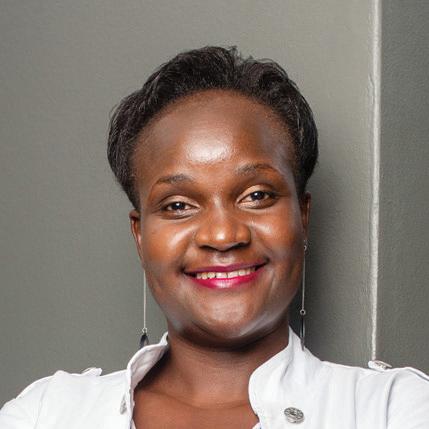
“This problem is particularly evident where a lot of material’s been covered. Students may not know where to start and endless amounts of available content don’t mean that information’s adequately retained or remembered,” she says.

She recommends 10 ways in which students can tackle their exams with confidence:
Be at your exam venue at least 30 minutes before your exam starts.
Stay calm and don’t panic. Approach every question in a calm way and take deep breaths when you feel overwhelmed.
Read the instructions and entire question paper before starting the exam.
Read each question carefully to ensure you understand how best to answer it.
Write neatly. Adhere to the mark allocation of each question. Refrain from giving too much or too little information.
Show your workings and calculations in brackets, if required.
Don’t use correction fluid or Tipp-Ex.
Don’t leave questions out –even if you’re unsure of a question, at least try to provide some answer.
Remember, you’re competing with yourself. Don’t panic if other students finish their question papers before you do.
“I also encourage students to take time off to rest and recuperate, when needed. It’s vital that mental health is looked after because stress and pressure are in abundance, while calm and focus are the key to examination success,” advises Aineamani.

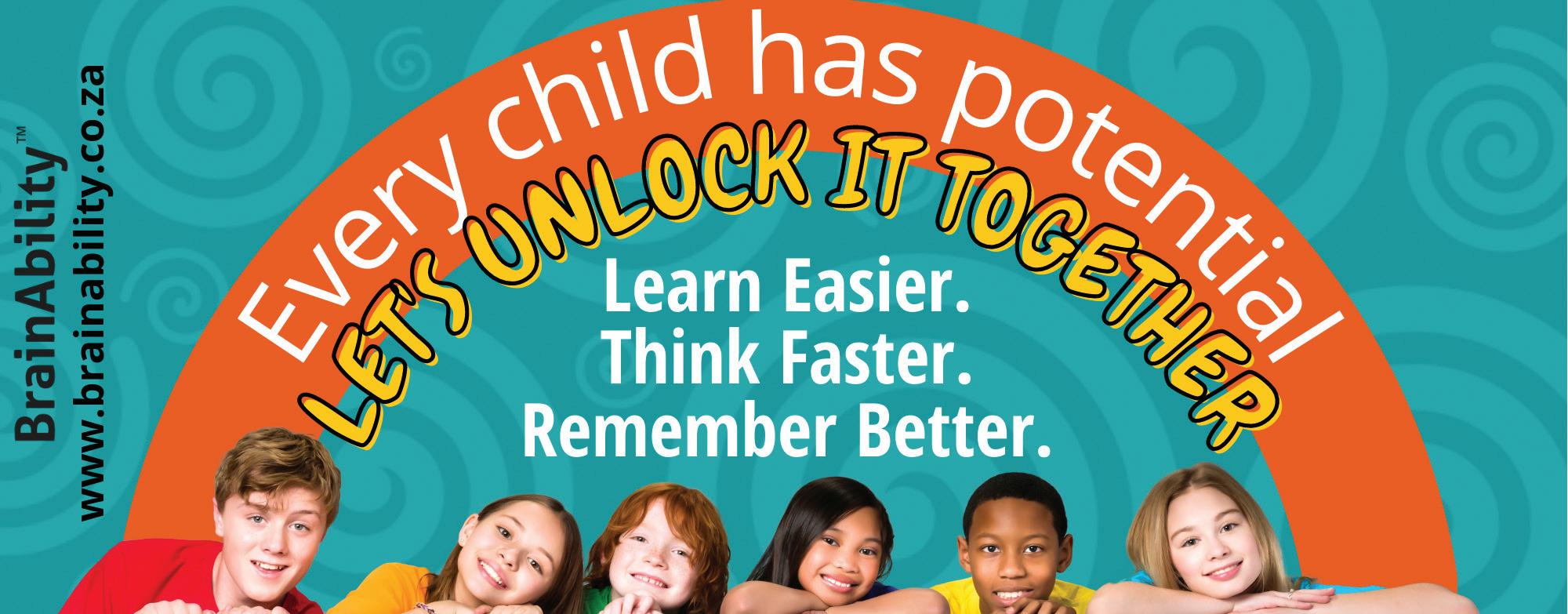




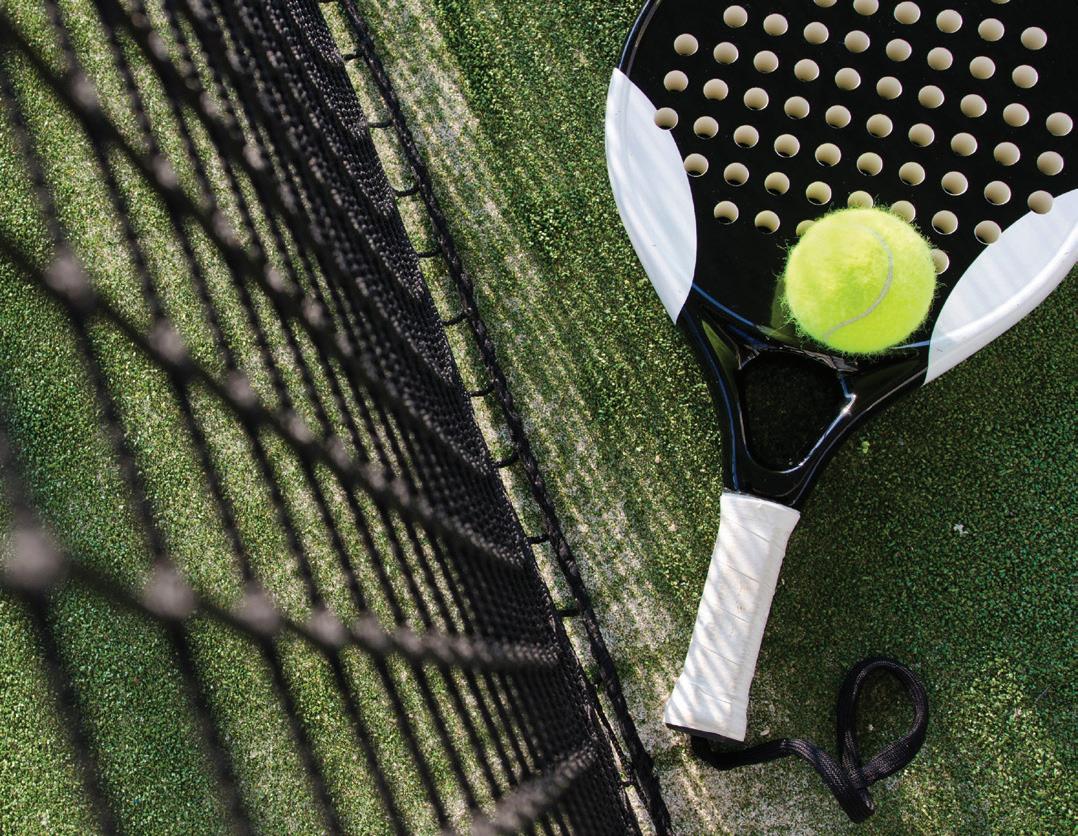

It’s nearing the time again that brings the stress of receiving your child’s end-of-year results. Perhaps these weren’t quite what you expected? You know your child and you know that they’re capable of achieving much more. Here are some suggestions to help you respond constructively
Some parents tend to react to their child’s school performance as if it were an evaluation of their parenting skills. Yet that’s not the case. By taking a step back from your child’s results, you avoid reacting too emotionally. A gentler and softer approach can, in fact, lead to better results in future.
With school grades, it’s really about the big picture, like a work ethic, good study habits and organisation skills –but sometimes seeing a bad grade sends parents into a tailspin.
Before over-analysing your child’s results, consider whether those results truly reflect your child’s strengths. It’s important to have expectations that match the potential of your child. Praise your child not only for their As, but also for getting better results in subjects with which they initially battled. Ask them which subject they’re proudest of and why. Ask: “What went right?” for a good grade to see how that achievement can translate to more difficult areas. Remember to concentrate on the efforts that your child made, as well as on
their observed progress. Most importantly, avoid comparing their marks with those of their friends or siblings. If your child gets 70-80% in most subjects, but only 60% in one particular one, it might not be something to worry too much about, as long as they’re making progress. For a small number of gifted students, a perfect report is attainable. However, for most students, the idea of getting “straight As” is unrealistic. Keep your perspective and ensure that your expectations are realistic at all times. The most important thing is that your child’s learning.
When discussing your child’s grades with them, begin the conversation with the words “I noticed” and avoid saying “you”. Often this will alleviate any feelings of blame and allow for a more open discussion. For example, you might say: “I noticed that your maths grade is a lot lower than we both thought it would be. Help me understand what happened,” rather than: “You didn’t do well in maths. This is unacceptable.” Think about the impact your words will have
on your child. They’ll probably remember what you said for a very long time.
When talking about poorly performed subjects, ask them if the work was too difficult or the content was too much. If they say they were bored or didn’t like the subject, ask them to explain their dislikes and try to address them. For example, if your child finds maths boring and not applicable to real life, or if they get easily bored when they revise maths, you can show them how maths is used in subjects they love, from shopping to computer games.

It might also be your immediate reaction to punish and restrict activities when you see lessthan-stellar results or to offer some reward for turning results around. However, it might be better to fight both urges.
Many parents threaten to take their child out of sports or extracurricular activities, but this isn’t an effective solution. Research shows that parents should avoid taking away activities that boost their child’s confidence, such as sports or clubs.
Know that rewards and punishment don’t work if you want your child to love learning. While it’s true that rewards can motivate students to get good
grades, there’s the risk that rewards could become their sole motivation. Be supportive of school, regardless of your own level of education. If you make learning enjoyable, children will do their best because they love to learn. That’s a much better long-term motivator than fear of punishment.

Before talking to your child, investigate plans of action. If you’re going to implement new
study rules or hire a tutor, have those ideas in place so you can present them to your child at the end of your talk. Give your child hope, understanding and love.
Look beyond the grades and remind yourself of all the wonderful qualities your child has. Are they doing well emotionally and socially? That’s a huge A+ right there. Are they kind and responsible at home? Do they try really hard to study well? Always start from a point of praise and move on from there.
Most importantly, remember that bad grades don’t define your child!
“Look beyond the grades and remind yourself of all of the wonderful qualities your child has. Are they doing well emotionally and socially? That’s a huge A+ right there.”
It’s why we emphasise collaboration so strongly. It’s why we are so focused on partnerships and relationships. Between Digitutors, EZ Learn, DT International Academy, and Born To Learn. Between you, the parent, and us, the experts. Between the tutors and the students. Between you and your child.
In the modern digital village, we have access to the minds, skills, and experience of people from all over the
world – we bring it right into your home. Exceptional partnerships, innovative teaching methods, experienced (and enthusiastic!) tutors, and personalised small group lessons bring all the power of the digital village to your child’s education needs.
We deliver British International Curriculum preparing students for GCSE, AS and A level examinations opening doors to tertiary and further education around the world.
With qualifications in Education and Psychology, and over 25 of experience Catherine Cuff heads up the team at Digitutors. She has a passion for Maths and Physics and for uncovering the potential of each student by understanding them as a person with their unique strengths and challenges.
WWW.DIGITUTORS.CO.ZA
Wilna Smith has 27 years’ experience in teaching computer-related subjects at government and private schools in South Africa. She has extensive knowledge of the IEB as well as British International GCSE and AS-level curriculums and is able to teach up to A-level.




WWW.BORNTOLEARN.CO.ZA


Danie completed his BA in Audiovisual Production Management and thereafter his PGCE at the University of Johannesburg. Danie has been teaching Afrikaans for over 14 years and has developed a series of online programs assisting students to achieve their best results in Afrikaans.
WWW.DANIETEACH.COM
Barbara founded EZ Learn based on the dream of providing lessons and resources that are easy and interesting to use. Since 2001 EZ Learn has aimed to make commercial subjects easy, relevant and fun for both students and teachers. WWW.EZLEARN.CO.ZA
For a full solution, guidance or even just some advice, contact us on admin@digitutors.co.za or whatsapp 082 604 7318 and join our Digital Village today.
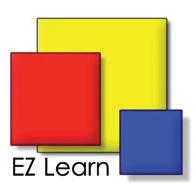 Digitutors
Digitutors

In a world that is seemingly filled with knowledge that can be accessed with the swipe of a finger or the touch of a button, how do we ensure our children are getting the resources, time, and education they need?
The collaboration between Digitutors, EZ Learn, DT International Academy, and Born To Learn takes the best of this digital world and creates a specialised digital village dedicated to the support and education of your children.
What sets us apart is how we structure the learning process. Small group online classes, private lessons, personalised learning paths, and best of breed educators in an interactive and engaging environment are what we bring to give your children an environment that stimulates and encourages.
But our partnerships go beyond the classroom. You, the parents, are an integral part of the learning experience. Whether you feel you have taught them as much as you are able to or are exploring homeschooling as an alternative to crowded traditional schools or are in a remote area with limited
access to educational facilities, you can be assured that we have your children’s best interest at heart – and that means working closely with you.
Feedback, one-on-ones, progress updates, and advice on subjects and future options all go hand-in-hand with the lessons to create an optimal pathway to your children’s success.
We offer a full range of subjects to our students but, rather than cramming as many pupils into a room as can fit, we bring the lessons into your home with small group online classes and private lessons. Our model ensures that every student benefits from a personalised lesson and is able to interact and engage with their tutor and
their subject instilling a love of learning into your children.
By tailoring the curriculum to your children’s interests and needs for further education we can concentrate on getting them the grades they need for success rather than dumping an overwhelming load of information that will never be used again.
Join our digital village and get the support you and your children need
All it takes is a camera-enabled device, a secure internet connection, and a willingness to give your children a headstart in a digital world and they will get the brightest and most enthusiastic tutors, plus the best educational support this digital world can offer. Join our village of support today.











Dalena van der Westhuizen will answer any questions or concerns you may have about learning, concentration, memory and cognitive development – and, of course, the frustrations arising from these processing skills can be tested and strengthened.)
My child has an incredible memory when it comes to places he visited years ago, as well as things he did when he was younger. However, when it comes to studying, it seems as if his excellent memory goes out the window and he’s unable to absorb his schoolwork for exams. Do you have any study tips to help him with this?

– Jana, Centurion
Hi Jana, It’s truly astonishing that a child can remember the ice cream you bought him when he was two years old, but struggles to remember the information he studied the day before!
As it turns out, different types of memories are stored in distinct regions of our brains. Recollections of experiences are called episodic memory These types of memory are our interpretations of events such as places visited or experiences your
son had when he was younger. The more enjoyable, funny, scary or awkward an experience was, the longer we tend to remember it.
Factual knowledge, like schoolwork, on the other hand, is part of our semantic memory. We need to do a lot more processing to understand the meaning and context of this type of information to enable us to store, recall and apply it.
This explains why your son remembers experiences more easily than abstract or subjective academic information that requires a lot more processing. (Do keep in mind that these
My children get distracted by everything. How can I motivate them to study?
– Jackie, Pretoria
Hi Jackie,
Studying becomes frustrating and time-consuming when children are continually distracted.
Unfortunately, for many children, it’s not easy – and sometimes even impossible – to start tasks and stay focused on them until they’re done, especially if they struggle with executive function challenges or ADHD. For them, remaining focused on a task that’s not highly interesting can be tough or near-impossible without huge effort and many incentives.
Here are some simple and practical strategies you could try:
• Objectively evaluate their workspace and environment, and remove anything that might distract them. Then make sure all the materials they’ll need are readily
available, but limit the number of items, especially stationery (they don’t need four different pens or three different pencils, etc).
• Take note of the time of day they’re usually at their best and try to schedule tasks that require longer focus during that time. Mornings, especially early mornings, are usually best.
• Break down tasks/ assignments/lessons into manageable chunks. Then set a timer for 25 minutes for work to be done, allowing fiveminute brain breaks in between tasks. Repeat two to three times, then allow a 30-minute break. (This is called the Pomodoro technique.)
• Some children find transitioning from one activity to another challenging and then struggle to focus on the new task. Giving advance notice about a transition can help a child prepare for what’s next, so put a simple schedule together for study time (or the day) and go over it before you start. Then give a reminder ahead of time about the next activity so that the children expect it.
If your children continue to be easily distracted, it might be time to dig deeper to find the cause of their attention struggles. Weak attention skills can be strengthened.
Hi Nicola,
Helping your child choose the right subjects is an important, but potentially nerve-wracking experience. While it’s always worthwhile talking to an expert in the field of subject choices, here’s a general guideline:

• Take note of any compulsory subjects from your curriculum provider/home education centre/Department of Education.
• Then take into consideration the career your child is interested in pursuing. Make sure that you research and take note of any subjects required for admission to studying in that specific field.
• However, keep the playing field open in terms of a possible change in your child’s planned career/field of study. Have a “plan B” in case of a shift in your child’s interest from one field of study to
About Dalena Dalena van der Westhuizen is the co-founder and MD of BrainAbility, a cognitive development specialist, a master brain coach and an internationally certified cognitive coach. She translates the latest international cognitive research and best practice into strategies that can be applied by parents and educators alike.
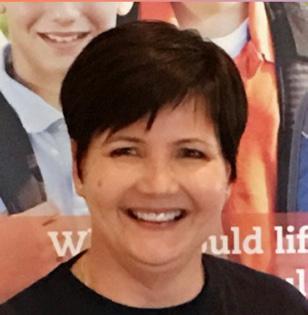
A mom and a self-confessed chocoholic, Dalena enjoys working with both kids and adults to improve the way their brains process information for better learning, reading and focusing.
Send your questions for Dalena to: adri@isikhova.co.za.
another a few years from now. Don’t narrow down too many subjects for a single field of study so that you’re left with no alternatives.
• If your daughter still has no idea what she’d like to study or pursue or as a career, don’t just choose “easy” subjects or only those she enjoys. Ensure that her subject choices gain her admission to various fields of study in tertiary institutions.
How can I best help my 15-year-old daughter with her subject choices for next year?
These days, almost all teenagers and even younger children have access to the Internet or a smartphone. However, with the privilege of technology come several dangers, says Friede Meissenheimer, who served as a senior social worker for the SA Women’s Federation for 13 years

Social media describes websites and online software that allow people to interact with each other by sharing knowledge, opinions, photographs, information and interests. Over the past few years, social media has played an increasingly bigger role in the lives of children and teenagers.
• It’s an easy way to express themselves and explore their identity.
• They can socialise with friends.
• They stay up to date with the newest developments in the lives of their friends, family and peer group.
• They can work together with classmates on projects.
• They can give and provide emotional support.
• They can explore their interests. What are the dangers of social media?
One of the biggest dangers among schoolgoing children is cyber-bullying. This takes place online, whether on smartphones or computers. It can take place
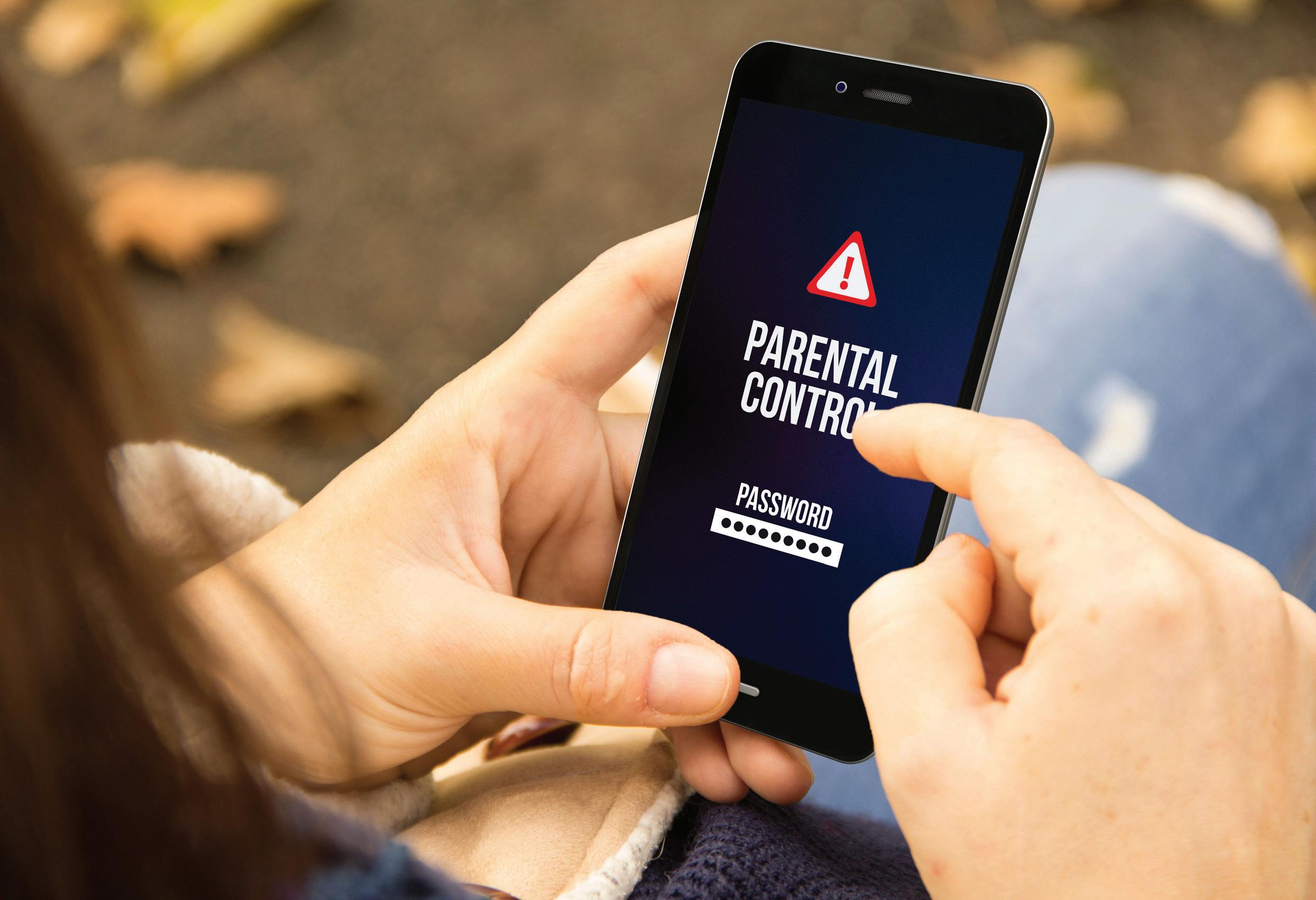
“Cyber-bullying is a serious matter with profoundly serious consequences. It can affect a child’s self-esteem, selfconfidence and social skills.”
24/7 and can quickly go viral. Cyber-bullying is a serious matter with profoundly serious consequences. It can affect a child’s self-esteem, selfconfidence and social skills. There have been cases which were so serious that children had to change schools or even committed suicide.
Children must learn to think twice about what they post on social media. Once something’s out there, it’s difficult to stop the sharing of information. If you wouldn’t print a post life-size and put it up in a public place, then don’t post it on social media. Remember, just because something was written in the privacy of your room or the intensity of an emotional moment, it will still be read, remembered and possibly reacted to by thousands of others.
A further danger which is growing among teenagers is sharing sexually explicit photos. These can be sent because of peer pressure or of their own free will. Sometimes a teen may not be

aware that a photo was taken of them and posted – and once an image is sent once, the flow can’t be stopped. Teenagers act impulsively and don’t always realise the consequences of their actions. Images like these go viral. The manufacturing and distribution of such material is a contravention of the following acts:
• The Film and Publication Act (Act 65 of 1996) forbids the manufacturing of any image, however it was created, of a person younger than 18 years shown in sexual positions or exposing body parts in a context that
can be seen as sexual. There’s no difference if the perpetrators themselves are younger than 18 or whether the photos are of their own bodies. Even if the images are of themselves, it’s still the manufacturing of child pornography.
• By sharing the images, a person is guilty of distributing pornography without a licence.
• Section 19 of the Act on Sexual Crimes (Act 32 of 2007) states that it’s a crime to show any form of pornography to minors.
Children and teenagers are also vulnerable to online grooming. Adults use fake profiles and information to befriend children online, usually with the intention of engaging in sexual activities. These people take their time to learn as much as they can about the youngster and often start conversations based on the child’s interests. Children are made to feel special


and important, and believe that this person is the only one who understands them.
Conversations escalate to a point where children are asked to send naked photos of themselves and receive a request for a personal meeting. Although it might seem innocent to begin with, it usually ends with sexual abuse. Children are often also coerced to run away with the perpetrator.

Teach children to keep their information private. Their privacy settings should only allow specific friends to see their posts.
Children must only accept friend requests from people they know personally. They should never chat to people they don’t know.

Be involved with your child’s online activities. A cellphone and Internet access is a privilege, not a right. A parent has the right to know passwords and the child’s activity on Facebook, WhatsApp and apps.
Teach children to be responsible for what they share online. They should never share anything they might feel embarrassed about later. Their reputations will always follow them.
Have access control that fits in with your child’s age and maturity. This can prevent them from inadvertently accessing inappropriate information.

Teach your children never to engage in online arguments that involve sending abusive messages, threats, or malicious or hurtful comments about others, especially when it comes to appearance, behaviour or rumours. These, too, are sure to be shared and remembered – and rebound.

How can you protect your children?




















Self-esteem comes from children feeling accepted, competent and effective. Parents can’t directly create those feelings in children – feelings are subjective and everyone’s different. However, what parents can do is provide experiences and feedback which make it likely that their children will draw the conclusion that they’re accepted, competent and effective.


When it comes to selfesteem, all kids are different. Some are naturally more confident and outgoing, while others may seem more shy or reserved. However, parents who’re worried about their child’s low self-esteem
Self-esteem is one of the most important characteristics of healthy child development. A child’s social, behavioural and emotional health plays a crucial role in how they handle setbacks, peer pressure and other challenges throughout their life
“You have to show trust in your children for them to be able to trust themselves.”
can look out for a few key signs that suggest a lack of confidence.

One of the most common signs is a decrease in overall happiness and an increase in negative thoughts and behaviours. In particular, you may notice that your child expresses feelings of sadness, anxiety or loneliness more frequently than usual. Additionally, they may start to withdraw from social situations or avoid interacting with others altogether. Bedwetting and unwillingness to go to school may also be noticed.

There are a number of ways to help children with low self-esteem.
Knowing how much you love them gives your children a sense of security and belonging that’s crucial to their view of themselves. Your unconditional love lays the groundwork for all the healthy and strong relationships they’ll form later in their lives. So hug your kids when you say goodbye, snuggle together to read a book and express your love every single day. As your kids grow, this foundation of love will help them as they continue to build their own social circles, make friends and form bonds with teammates.

When it comes to raising children, praise is essential to helping them learn and achieve their best. Praising efforts rather than results can help children develop good work habits, embrace challenges and learn more effectively. For example, if a child receives praise for working hard, even if their results aren’t perfect, they’ll be more likely to keep putting in the effort.
This teaches resilience and helps build their confidence and selfesteem. Additionally, focusing on efforts instead of outcomes encourages kids to try new things and approach tasks with a growth mindset. They know that mistakes are an opportunity for learning, rather than a sign of failure.
We all want to protect our kids from harm. And if you have a child who learns and thinks
differently, it’s only natural to want to throw your protection level into overdrive. However, it’s easy to fall into the trap of shielding your child too much. Over-protective parents unwittingly deprive a child of learning problem-solving, dealing with disappointment and taking responsibility for their actions. Some children of
over-protective parents become rebellious as teenagers, often challenging authority figures. You have to show trust in your children for them to be able to trust themselves. Guide, but don’t control.
As parents and caregivers, we play a big role in shaping our children’s self-esteem. One of the best ways to help children develop healthy self-esteem is to model it ourselves. When we have a positive attitude and high self-esteem, our children are more likely to have them as well. That’s why it’s so important to be mindful of the way we speak about ourselves. We should also take care to avoid comparing ourselves (and our children) with others. This requires that we be
Self-esteem is basically how children see themselves – including what they think of themselves and their ability to do things. It’s shaped by how loved and worthy they feel and how much support and encouragement (or criticism) they receive from important people in their lives, like their parents and caregivers.

• Adapt to new situations and make friends easily.
• Will try to work things out for themselves.
• Are willing to ask if they’re unsure.
intentional in everything we say in front of our kids.
If you raise a confident child who grows up with healthy selfesteem, it means they have a realistic understanding of their strengths and weaknesses, enjoying the strengths and working on the problem areas. There’s a strong parallel between how your children feel about themselves and how they act. Throughout life, your child will be exposed to positive influences
• Are proud of their achievements and can admit their mistakes.
• Are willing to try new things.
• Have a positive view of themselves.
• Feel secure enough to be kind and generous to others. (builders) and negative influences (breakers). Parents can expose their child to more builders and help them work through the breakers.
Self-esteem is a remarkable and crucial quality for an individual to excel and be happy. If you can imbibe the same in your children, they’ll be invincible in the face of failures and challenges for the rest of their lives.
“There’s a strong parallel between how your children feel about themselves and how they act.”






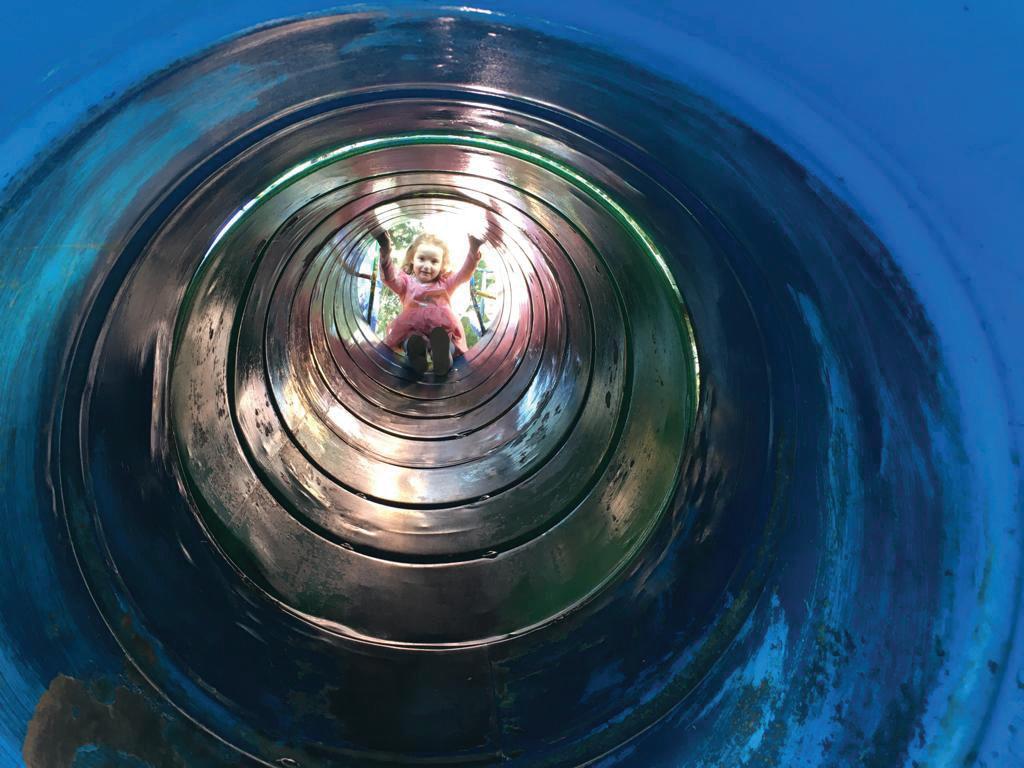
From a coastal holiday in the Cape to a bushveld escape in the Lowveld, in SA we’re spoilt for choice with holiday spots. If you’re travelling with your family this December, we have eight top tips to keep kids of any age entertained on the road
Keeping kids of any ages entertained on a long car trip can be challenging, but with the right games and activities, travelling with them can be fun and (sort of!) relaxing

Play games I Spy, 20 Questions or I’m Going on a Camping Trip may spring to mind, but there are lots of other games you can play with kids on a long car journey. Try spotting a certain colour car and the one who spots the most wins. For older children, take some travel games with, such as Yahtzee, Snakes and Ladders and Auto Bingo. A deck of cards to play games like Snap could also be a good idea. You can also search the Internet for word games and kids’ crosswords.
Sticker books Buy a set of activity/sticker books ahead of your journey. It’s an obvious choice, but you just can’t beat sticker books for long car trips. Not only are they mess-free, but they can keep kids preoccupied for ages. Whatever


your kids enjoy, there’s a sticker book for them!
Audio books An audio book is a great way to make lifelong memories with your family. They’re a sure-fire way to kill time in the car with minimal input from grown-ups and may even lull the younger ones into a peaceful slumber. There are many places where you can buy or download audio books, such as Audible or iTunes.
Choose from classics to newlyreleased books.
Drawing pads and pens Pack a drawing pad and pens so they can doodle. You could get them to take part in a competition by drawing something you describe. They could also play games like Hangman or Noughts and Crosses.

Snacks! There’s something about a long car journey that makes you think “food”. The problem is that it can make the car very messy. Pack healthy snacks like cereals, crackers, cheese cubes and grapes in Zip-Loc bags

and make sure you take a trash bag with you. Also check out our tasty family padkos recipes for road trips on p30.

Break up the trip Put up Post-Its and take them down whenever you reach a milestone (eg 100km, 200km, or a landmark along the route, such as a river, a town or entering a new province). Cheer and give the kids a small treat – it will get everyone’s attention for a few minutes and break up the monotony of the ride.
Take your time when stopping When stopping for petrol, a loo break or a cooldrink, take your time. Walk around, stretch and explore a little. Burn that energy!
Screentime It’s inevitable that the kids will want to have some screen time for part of the journey and that’s totally OK. Try to give them chunks of 15-30 minutes at a time to avoid motion sickness. You could also switch up the games they play with some educational apps.

With a little bit of organising, there are plenty of ways to keep kids entertained during a long car journey. Try our eight top
tips, which will certainly help you drive more peacefully and minimise the dreaded cries of: “Are we there yet?”

“Try our eight top tips, which will certainly help you drive more peacefully and minimise the dreaded cries of: ‘Are we there yet?’”
are we there yet?
Going away this December holiday? The best part of a holiday road trip is the delicious padkos that you nibble during your journey


Chef and mom-of-four Anri Fourie shares these yummy, easyto-make recipes that are sure to make your journey just as enjoyable as the destination.
Crispy potato chip chicken drumsticks
Preparation time: 15 mins (does not include an hour’s marinating time)

Cooking time: 40 mins
Ingredients:
12 chicken drumsticks
1 large packet chutney-flavoured chips (or any flavour of your choice)
250ml (1 cup) mayonnaise

100ml (6½T) lemon juice
10ml (2 tsp) paprika
10ml (2 tsp) garlic powder
10ml (2 tsp) onion powder
Salt and pepper to taste
What else you’ll need:
Marinating bowl
Mixing bowl
Baking tray
Method:
1. Mix lemon juice, paprika, garlic powder, onion powder, salt and pepper in the marinating bowl. Leave to marinate for an hour.
2. Once marinated, pre-heat oven to 180˚C.

3. Crush the potato crisps finely.
4. Remove drumsticks from marinating bowl and coat with mayonnaise.
5. Roll drumsticks in the crushed potato chips.
6. Place drumsticks on a baking tray and bake for 40 minutes (or until golden-brown and crispy)
Mini pitas with tuna filling Preparation time: 15 mins
Ingredients:
12 mini pre-made pita pockets
2 x 170g tins light shredded tuna in brine, drained
62ml (¼ cup) mayonnaise
2 spring onions, finely diced
2 tomatoes, finely diced
Half a cucumber, finely diced Salt and pepper to taste

What else you’ll need:
Knife for dicing and opening pita pockets
Mixing bowl
Method:
1. Trim an opening from the top of each pita pocket or cut them in half so that they can be filled.
2. Mix the tuna with the other ingredients.
3. Add salt and pepper to taste.
4. Fill pita pockets.

More filling options:
Chicken mayonnaise
4 chicken breasts, cooked and shredded 125ml (½ cup) mayonnaise 62ml (¼ cup) sweet chilli sauce
Chopped fresh basil
Vegetarian
1 red bell pepper 1 green bell pepper 1 yellow bell pepper
1 punnet button mushrooms
Method:
1. Slice peppers in strips and mushrooms in quarters.
2. Fry in 15ml (1T) olive oil until soft.
3. Season with salt and pepper.
Ouma’s cheese and bacon muffins

Preparation time: 20 mins
Cooking time:15 mins
Ingredients:
500ml (2 cups) flour
5ml (1 tsp) salt
20ml (4 tsp) baking powder
1 egg 125ml (½ cup) oil 250ml (1 cup) milk
15ml (1T) chopped fresh parsley 250ml (1 cup) grated cheese
1 packet diced bacon
1 large onion (diced) 10ml (2 tsp) Marmite or Bovril
What else you’ll need:
Medium-sized frying pan
2 mixing bowls
Large spoon
Muffin tray (sprayed with Spray ’n Cook)
Method:
1. Pre-heat oven to 200˚C.
2. Fry onion and bacon and leave in pan to cool.
3. Sift all dry ingredients into a mixing bowl.
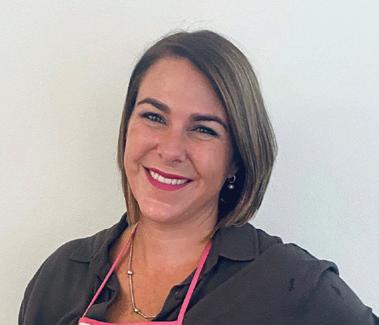
Anri Fourie, owner of two guesthouses and mom of an eight-year-old daughter and four-year-old triplets, cooks meals that are quick and easy to make – with multiple little helping hands. In the Fourie household, family time is a great time to cook together. As the former owner of a coffee shop, Anri used to share the kitchen with skilled chefs. Today she shares it with her four busy little offspring, who’re all eager to pitch in and help.
6. Add fried onion and bacon to the mixture.
Something cool for the flask

Lemonade with a twist
1L Sprite (or lemonade)
1L ginger ale
375ml (¾ cup) passion fruit cordial Mix well and refrigerate before filling the flask.
4. In a separate bowl, mix together eggs, oil and milk.
5. Add dry ingredients to egg mixture.
7. Add bacon, parsley and cheese to the bowl and mix well.
8. Scoop mixture into muffin pans using a large spoon.
9. Bake for 15 mins.
A ll aboard the Diaz Express, a fun experience for the whole family run on the existing Transnet rail network in the Garden Route region between George and Mossel Bay. Hartenbos serves as the main
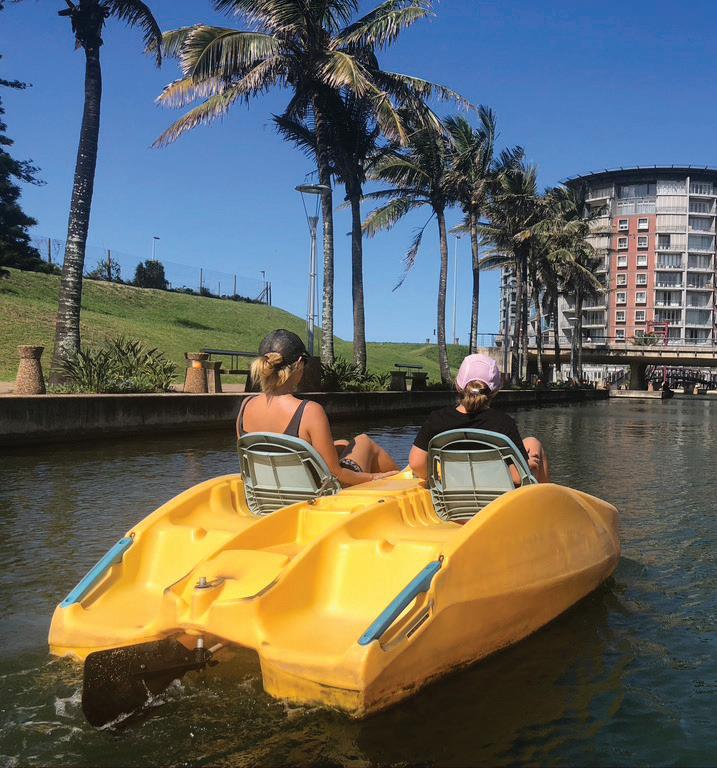
Pedal boat rides are always great fun! Located at the Durban Point Waterfront, the canals contain over 30 types of sea fish that can be spotted. Relax and enjoy pedalling along the canals, which offer great scenery. The ride is easy and safe, as the canals are all shallow. Pedal boats are comfortable and can accommodate two adults and two children. The ride lasts 30 minutes or 1 hour.
Fun local events and outdoor activities in your city and nearby places for the whole family

point of departure to a variety of attractions, including the ever-popular Great Brak River, Glentana and Maalgate. All excursions have lovely views over the Indian Ocean, river estuaries and the indigenous
plant life of the Cape Floral Kingdom. During the December holiday, the train will depart four times a day (9am, 11am, 1pm and 3pm) from Hartenbos station to Great Brak. Passengers can return immediately or spend time in Great Brak River and take a later train back.
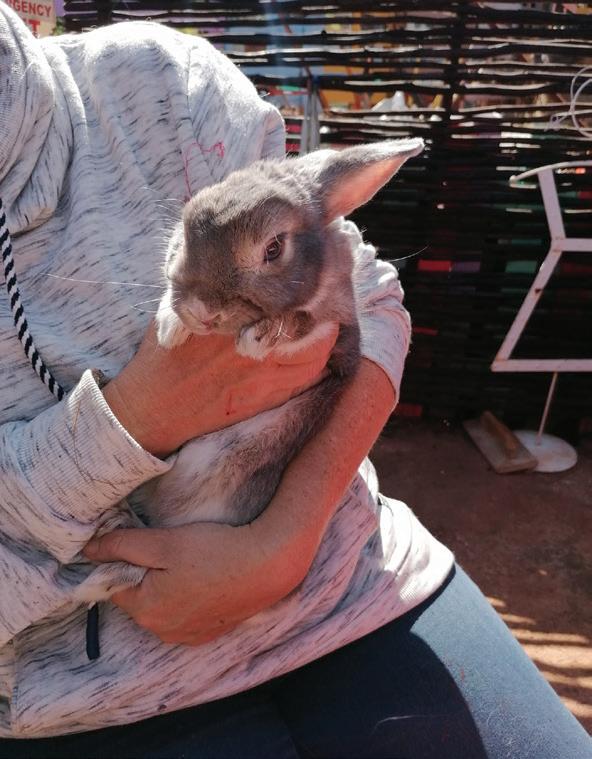
Run by a dedicated team of staff and volunteers, the Bunny Hop Haven is home to rescued and rehabilitating farm animals and exotic pets. Besides being an animal sanctuary, it’s also an educational and play centre. The educational programme is for babies from three months to children of 12 years. Through sensory stimulation, recycling, gardening and animal care, children are able to learn about their environment and the natural world. Located at 59 Frederick Street in Johannesburg, it’s also open
on weekends for families to come and interact with and feed the animals. The basic entrance fee covers the cost of the vegetable buckets which kids get, as well as vet fees and staff salaries.
Having a vegetable garden can be a fun and easy way to keep the whole family healthy. And when you grow the fruits and vegetables together, everyone’s more likely to be excited about eating the produce they helped raise!

Gardening can be a rewarding family activity, but teaching your children how to grow their own food is especially gratifying. When kids grow their own food, they’ll find there’s a certain pride and satisfaction that come with it. Being able to walk out into their garden and harvest the produce they grew themselves is rewarding at an almost primal level.
However, there are also a number of other benefits to growing your own fruit and vegetables as a family.
In an age when the lure of technology is leading to ever more screen time, anything that gets kids outside into the fresh air has to be good. Being outdoors is great for health and well-being. When kids take the time to prepare, plant, weed, water and harvest the garden, they’re getting sunshine, fresh air and physical activity. The exercise they get can help them stay in shape, as well as relax and destress. And because the garden needs to be tended, kids are guaranteed to have some active time each week outside,
“You’ll be growing their brains right along with your crops.”
either on their own or with the family. Make sure everyone uses sunscreen and drink plenty of water while outside.
These days you can buy pretty much every kind of food in a plastic packet from a supermarket and with the rise of convenience products, it’s scary how so many of us have lost touch with where the food actually comes from. Growing your own food is a great way to educate kids about how fruit and vegetables grow and the effort that goes into it. It’s also eco-friendly. Think about how much packaging comes with fruit and vegetables from the supermarket, not to mention the carbon footprint from food that’s been transported over long distances, often from abroad. Growing their own helps kids see how much can be saved on packaging and air miles, so it’s great for the environment.
When you have a full, healthy garden, kids will see you spend less money at the grocery store too. They’ll also have all the ingredients they need for their favourite salads – and when they can harvest potatoes to roast in their own backyard, they’ll realise how self-sufficient they can be. With organic gardening, they’ll learn that the cost of a packet of seeds is far less than what
you’d spend on organic fruits and veggies at a store.
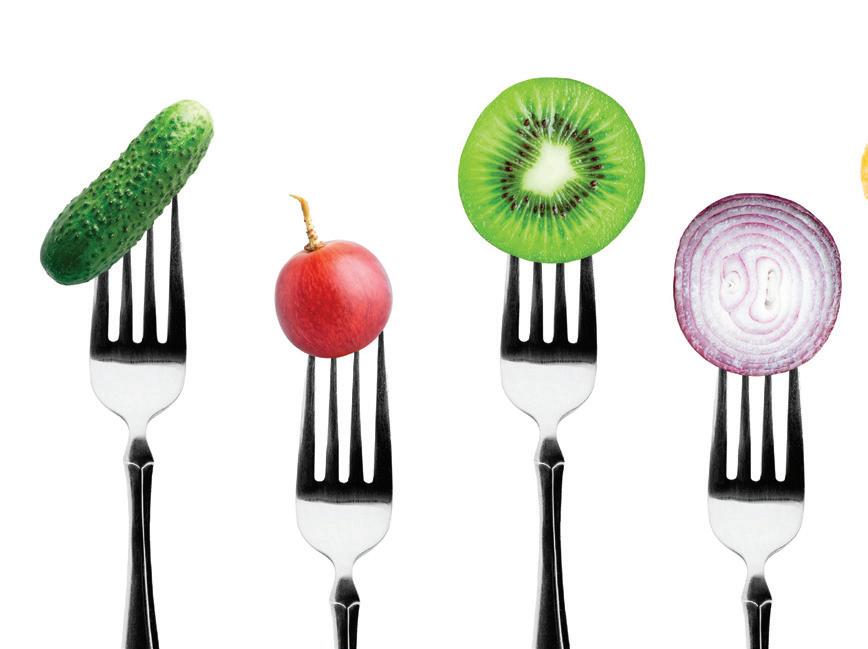
Beyond the initial crop, kids can also learn to dry, bottle and preserve the produce to keep feeding the family long after the growing season’s over. This can extend savings in the long term, too. What’s more, if their produce is really successful, they could even sell some of it to neighbours or friends – a great way to augment their pocket money!
of growing your food, you’re much more likely to want to taste it once it’s ready. Growing their own fresh fruit and veggies is an excellent way to get kids excited about eating them!
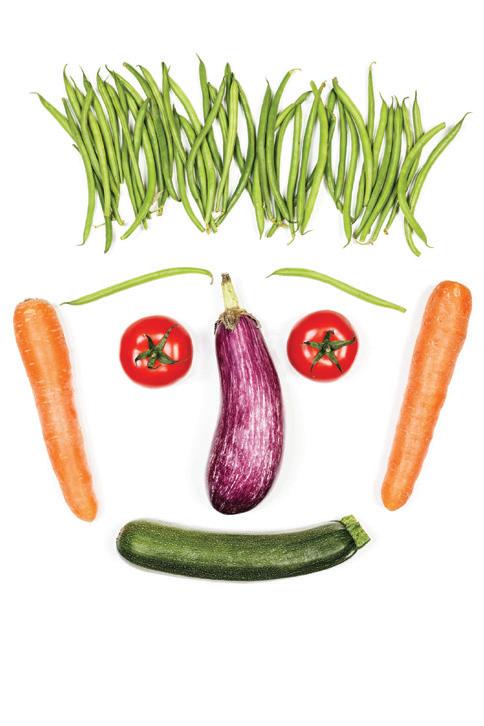

Gardening also teaches children responsibility. Even the easiest vegetables to grow must be cared for and watered regularly, so give your kids responsibility for their own little set of seeds or plants and encourage them to take complete charge of them. Teaching children how to grow their own food is also a really useful skill that they’ll never forget. It can help build healthy habits that will last them a lifetime.
Finally, having a backyard vegetable garden of your own encourages everyone in the family to eat healthy food. If you’re going to go to all the effort
Having a vegetable garden is a wonderful and magical thing that should be part of every child’s upbringing. Even if you aren’t a seasoned gardener, it’s easy to undertake a family plot. Simply aim to learn alongside your little ones. Whatever you choose to do, take the opportunity to educate your children as you go. You’ll be growing their brains right along with your crops.
The saying goes: “Give a man a fish and you feed him for a day. Teach a man to fish and you feed him for a lifetime.” The same applies to carrots, potatoes, green beans, tomatoes, cabbages, pumpkins, peaches and a range of other produce!

Imported from Mexico and widely played in Spain for over 20 years now (it’s actually the second-most popular sport, after football, in that country), padel is the new phenomenon of racquet sports here in South Africa.
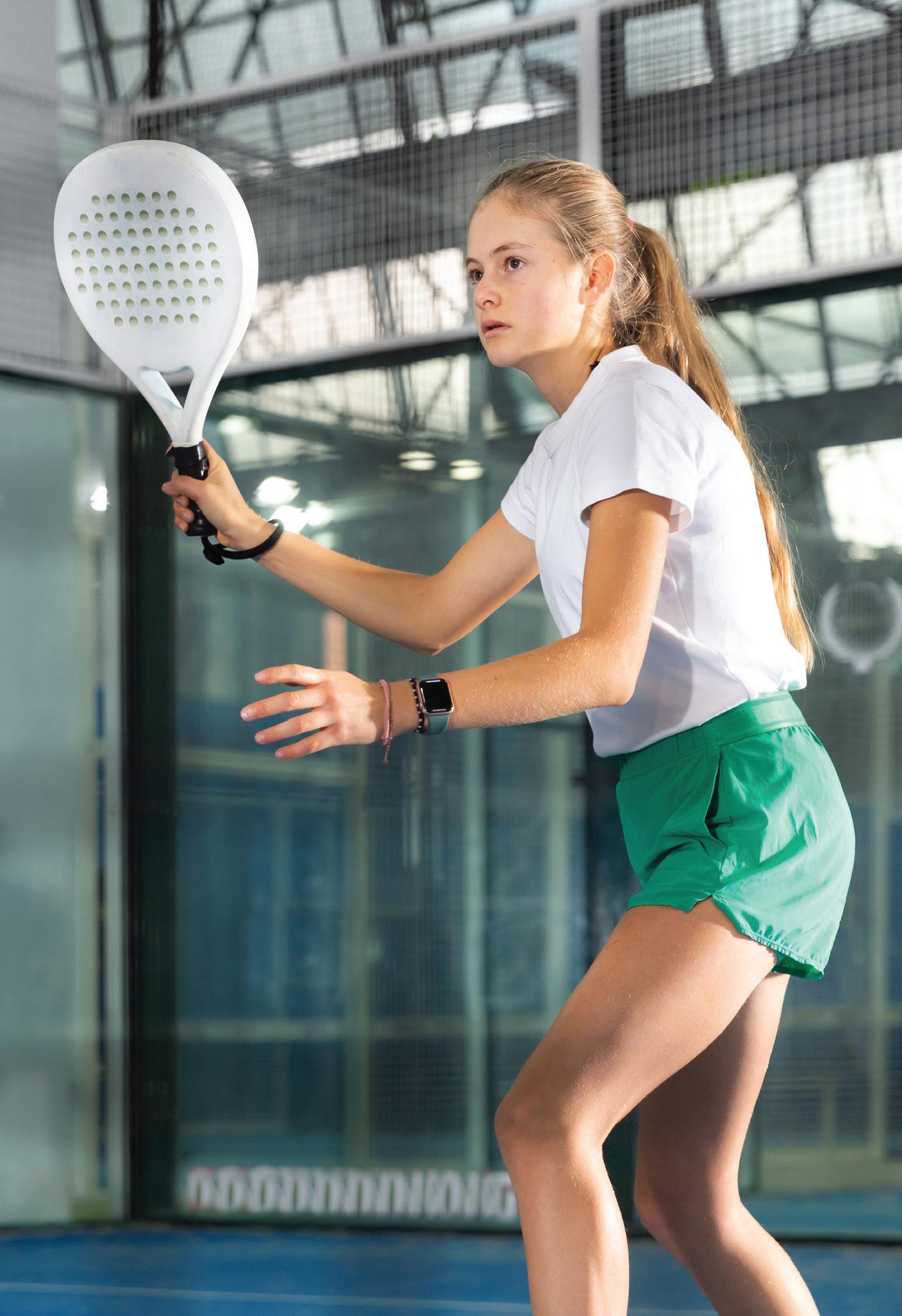
On a rectangle of 20m x 10m, separated by a net and bounded by glass walls, two teams with two players each compete using solid, stringless racquets (as opposed to those used for tennis) and a ball slightly smaller and less “bouncy” than a tennis ball.
If you’re intrigued by the idea of playing, here’s what you need to know:
What’s the difference between tennis and padel tennis? While having a middle net and the same court markings, the main differences are that the court has walls along the back and side and the balls can be played off them (rather than being out in tennis), similar to squash.
Is padel scoring exactly the same as in tennis?
Yes, padel tennis scoring is exactly the same as in tennis. Points go up as follows: 15, 30, 40 and game. Thus, a 40-40 tie is called “deuce” and the winner is the first player to lead by two clear points. A one-point lead at deuce is called an “advantage”. To win a set, a pairing should
Described as “tennis with walls” or “squash in the sun”, padel tennis is one of the fastest-growing sports in the world. It’s super-fun and great for all ages
win six games with two clear games. If the score reaches 6-6, a tie-break is played in which the winner is the first side to get to seven points with two clear points. If the game continues to be tied at 7 points, then the tie-break continues until the
first side to have a two-point lead is declared the winner. Games of padel are played as the best of three or five sets. The first pair to win two or three sets are declared the winners (the number of sets should be agreed on beforehand).
Can padel be played one versus one? There are single padel courts sized 20m long x 6m wide, but these are rare. In theory, you can play singles on a doubles court, although it isn’t recommended. Standard padel tennis courts are designed for doubles and covering half your side each player, allowing for good-length rallies and no over-stretching of players. Unlike standard tennis, which allows inner lines to be

used, a padel tennis court can’t be adjusted, as this would require bringing the walls in closer, leaving the same surface area as a doubles court.
Why is padel tennis so popular? It’s fun, easy to pick up, welcomes all ages and abilities and, unlike standard tennis, is far more forgiving due to the sides around the court, resulting in longer rallies and even more enjoyment! More and more padel tennis courts are being installed and available to use in most major cities in SA.
sportShould kids play? Definitely! Padel promotes teamwork and handeye co-ordination.
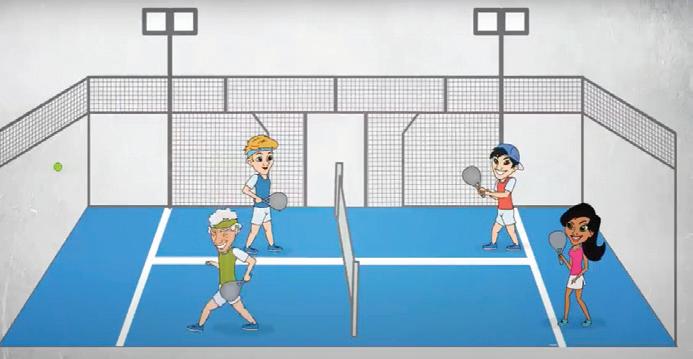
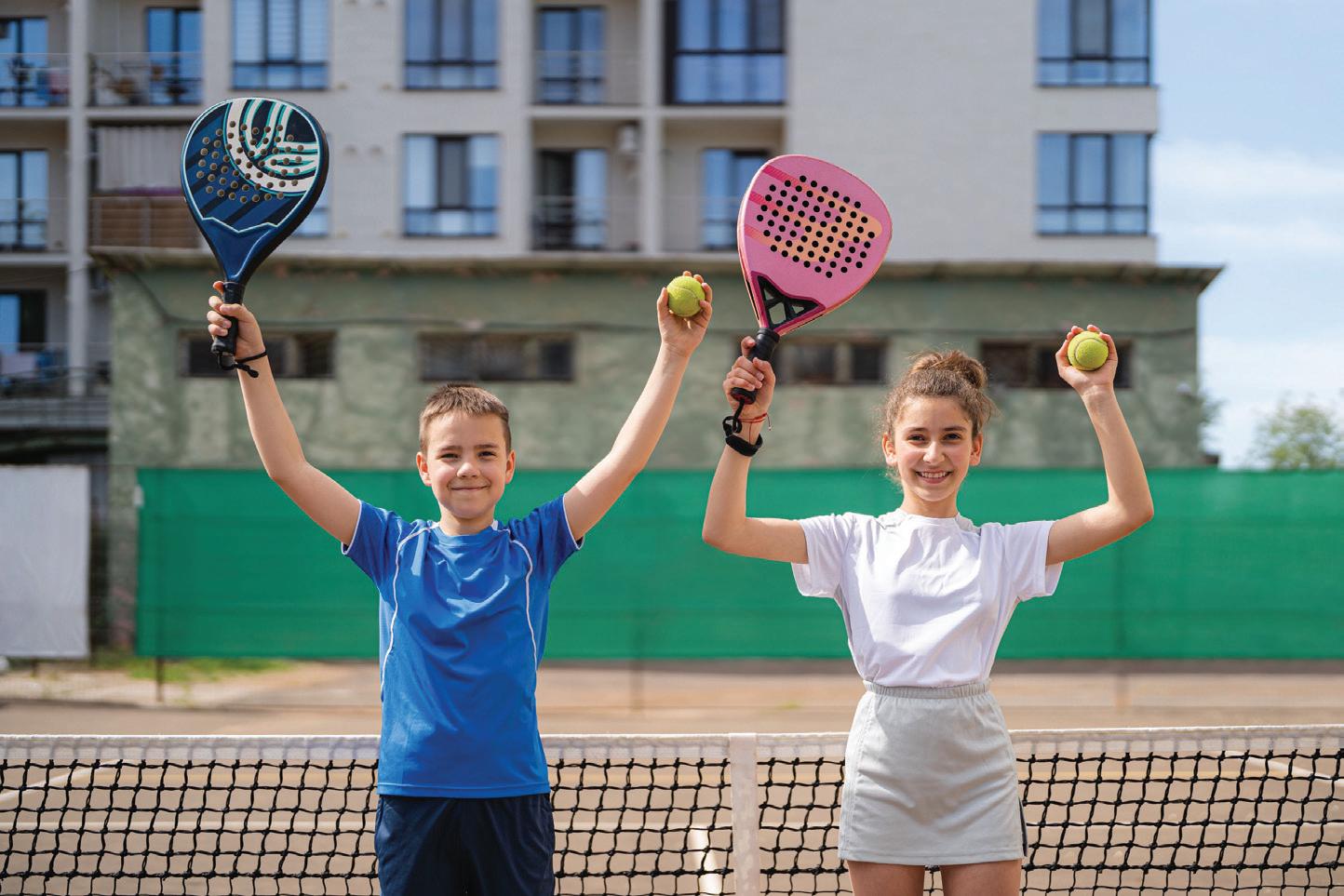

What are some of the other benefits of padel? Padel is a marvellous way to gain physical fitness and almost
anyone, regardless of their physical shape, can play. It also appeals to a wide population and is a cross-generational game, meaning grandparents can compete with their grandkids, without physical strength being the sole determinant of the winner. It’s also an entertaining sport to watch.
For more information on padel tennis in SA, where to play and upcoming tournaments, contact the SA Padel Association (SAPA) or visit: www.sapadel.co.za. It’s a little whacky, really good fun and very social, so why wait!?


From university residences to private accommodation or living at home, there’s no shortage of options available for prospective students. What type of independent living will your child go for next year?
Decisions, decisions, decisions. After pinpointing a course and tertiary institution to study at, the next serious conundrum for prospective students is accommodation.
Finding a place for your child to live once it’s been confirmed what and where they’ll be studying can be an exciting and confusing time. Finding the best type of student accommodation depends on many different factors and compromises will need to be made. The good news is that there are so many different types of student accommodation out there that you’re bound to find something which suits your child’s lifestyle.
“As parents, you know your child best and can help guide their thoughts around the most appropriate choice. Your support and interest are invaluable during this period.”
When choosing student accommodation, keep the following things in mind:
• Total cost – including expenses such as utility fees.
• Commuting – is it close enough to campus and easily accessible?
• Amenities – will your child have easy access to shopping centres, etc?
• Safety – will your child feel safe?
The most common types of student accommodation in South Africa include:

Privately rented accommodation If your child’s the type of student who values privacy, then they might want to opt for private accommodation. This is usually situated off campus and may include private apartments, large private residences or shared flats or cottages with friends and/or other students. Even though your
child won’t have the convenience of living on campus, it’s still a very popular option.
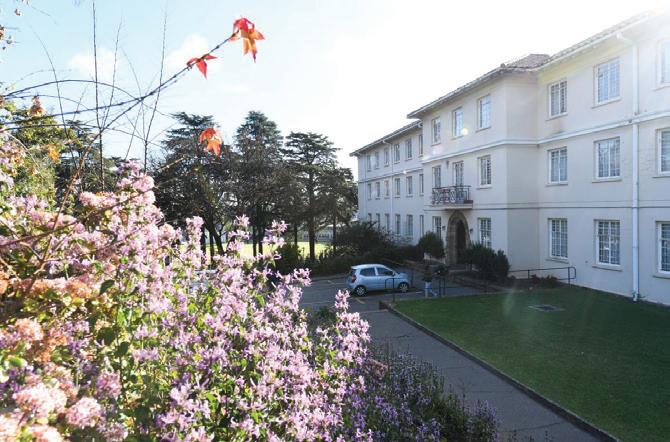
University residences Most South African universities provide furnished accommodation that comes with numerous facilities. These residences are owned and operated by the university and are often the preferred
option for first-year students. Since they’re usually located on campus, they’re convenient (near the library and other university facilities) and are therefore in high demand. Some offer catered accommodation, in which case extra fees will be charged to cover the cost of meals. Living in a university residence offers socialising opportunities, which makes it easier for your child to meet new people and make friends.
Private-sector halls of residence Private halls are similar to university residences – your child will have their own room and some communal areas, such as a kitchen, lounge and laundry room, but these are owned by commercial companies. Although some of these types of student accommodation work in partnership with universities, they’re generally not located on campus. Compared with university residences, they may offer a greater choice of rooms, often including a small kitchen and bathroom.
Living at home Many students choose to live at home while studying – either because of personal choice or for financial reasons. This is a particularly popular option for students who live relatively close to campus, making it easy to commute. They also have their support system

on tap and won’t feel homesick, which is often a struggle for those living away from home.
Parent purchase Another type of student accommodation is for parents to purchase a house or flat and act as landlords to a group of students, including their child. As the landlords have a vested interest, the property’s usually well maintained, as their child’s living there too. In this kind of buy-to-let situation, parents may prefer to hand the property management over to a local letting agent.
With so many housing options, it’s worth taking the time to consider your child’s needs carefully before deciding on



Your feedback is essential in helping us put together a magazine which delivers on-point content relevant to your homeschooling experiences and support needs and helps you navigate your child/children’s education with ease and confidence.
You are the core of the publication, so let’s live and learn together. Email our editor, Adri Viviers, at: adri@isikhova.co.za.

the type of accommodation that will make their student years as pleasant as possible.
As parents, you know your child best and can help guide their thoughts around the most appropriate choice. Your support and interest are invaluable during this period.




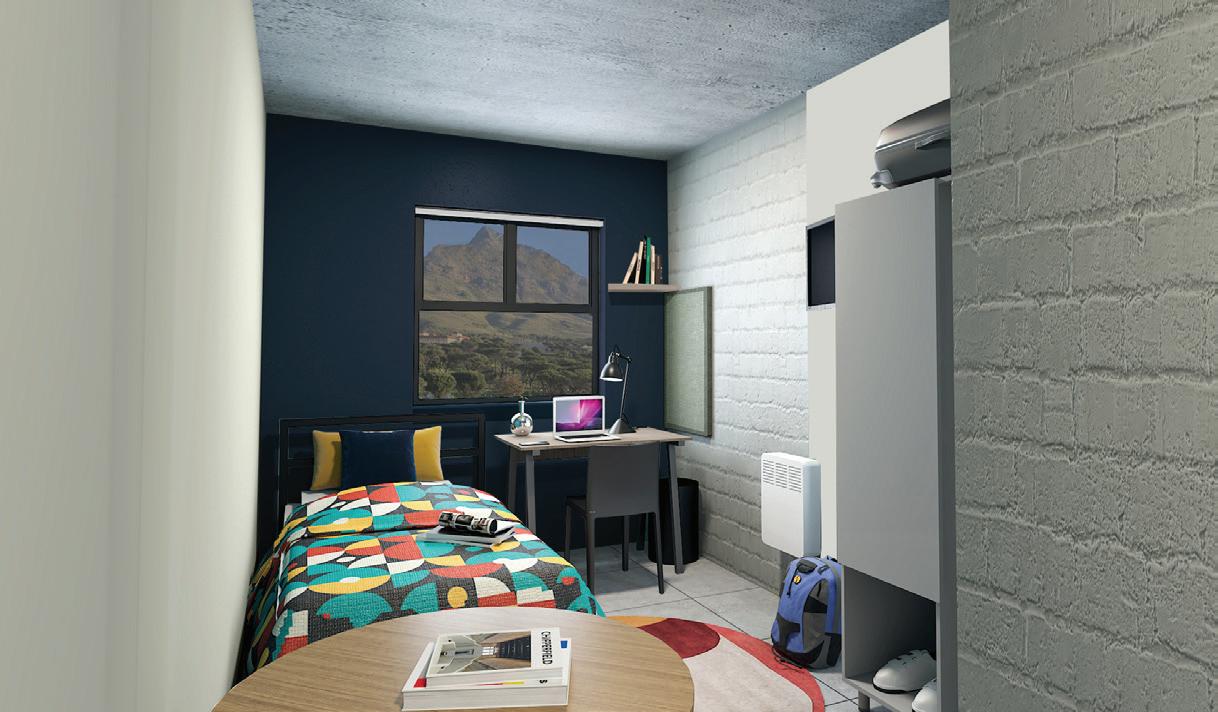




Thousands of students’ educational journey is being supported by the Tomorrow Trust, a South African non-profit organisation that provides academic, career, psychosocial and digital upskilling to vulnerable children and youth
t’s my dream to study information technology [IT] one day,” says 15-year-old Tembisa Secondary School pupil Luyolo Zondi. “I’m a person who likes to explore and IT allows me to do that.”

Luyolo is just one of the many youngsters whose educational journey is being supported by the Tomorrow Trust. Now in Grade 10, he’s been with the programme since the start of his school career and says the holiday and Saturday classes offered have given him the edge at his place of learning. “I’m very interested in program ming and coding and I also
enjoy physical science. What the Tomorrow Trust has helped me most with is my confidence in those subjects,” he says.
“The classes have helped me improve my school marks. Actu ally, because of the programme, I find myself two steps ahead of the others in my class.”
Luyolo isn’t alone in his praise for the Saturday school and holiday programme, which is geared towards building and strengthening English, maths, life sciences and physical science.
Another Tembisa High School pupil, 16-year-old Sandile Vilakazi, has been with the trust since the age of seven.
“It’s helping us build a better future for ourselves,” he says. “It’s really helped me a lot and I find that I’m doing well at school. The teachers are very kind and patient with us, always making sure we understand the work.”
Sandile, who’s especially inter ested in robotics, aims to study at the University of Cape Town on completion of his schooling.
Another pupil who says he has a “better chance” of carving out a career in IT because of the programmes support is Njabulo Kubheka, 16, of Inqayizivele Secondary School.
Like Luyolo and Sandile, he joined the trust’s programme from a young age.
“The classes make you think outside the box and the facilitators are very patient. You can always ask questions to make sure you understand the work properly,” he says.
“I’m sure that without these classes, I wouldn’t do as well at school. I don’t mind doing the work at all. It’s really helping me to one day get into the University of Cape Town, which is my dream.”
Entities like the Tomorrow Trust are vital if SA’s less privileged students are to rise above their circumstances and prosper. For every 100 South African pupils, only 51 make it to matric, while 40 finish high school and 16 qualify for tertiary study. Just two will graduate from university or college.
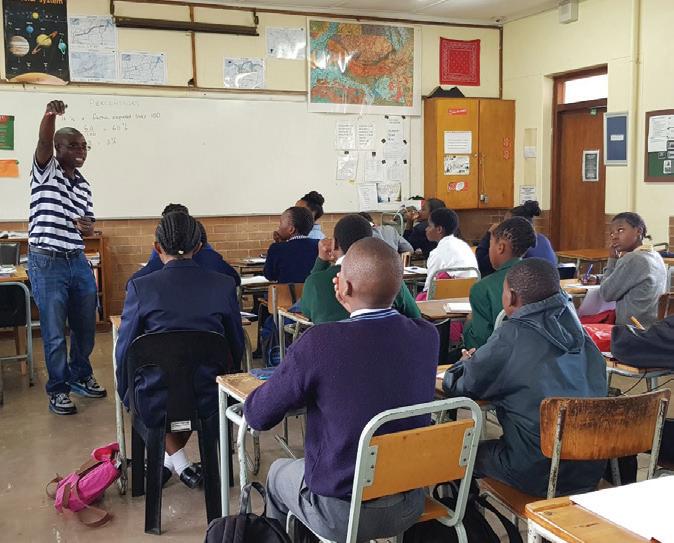
The trust is determined to break this cycle through its learning programmes and holistic approach. Not only do pupils’ subject performance improve, but they’re required to give back to younger students and their communities. As those commu nities become better educated, economies thrive, jobs increase and poverty rates decline.


The Tomorrow Trust receives its own support from the Datatec Educational & Technology Foundation, which has also
recognised the importance of investing in maths and science programmes in townships to produce outstanding graduates who’ll not only take the country forward, but also uplift their own communities.

“Our vision for SA is perfectly aligned with that of the Tomorrow Trust,” says Datatec Foundation Chairperson Maya Makanjee.
“In order for us to grow as a nation, it’s imperative that no child is left behind, regardless of their background or upbringing. Our commitment to improving performances in the science, technology, engineering and maths subjects is because we believe these are key to unlocking prosperity for all South Africans.”
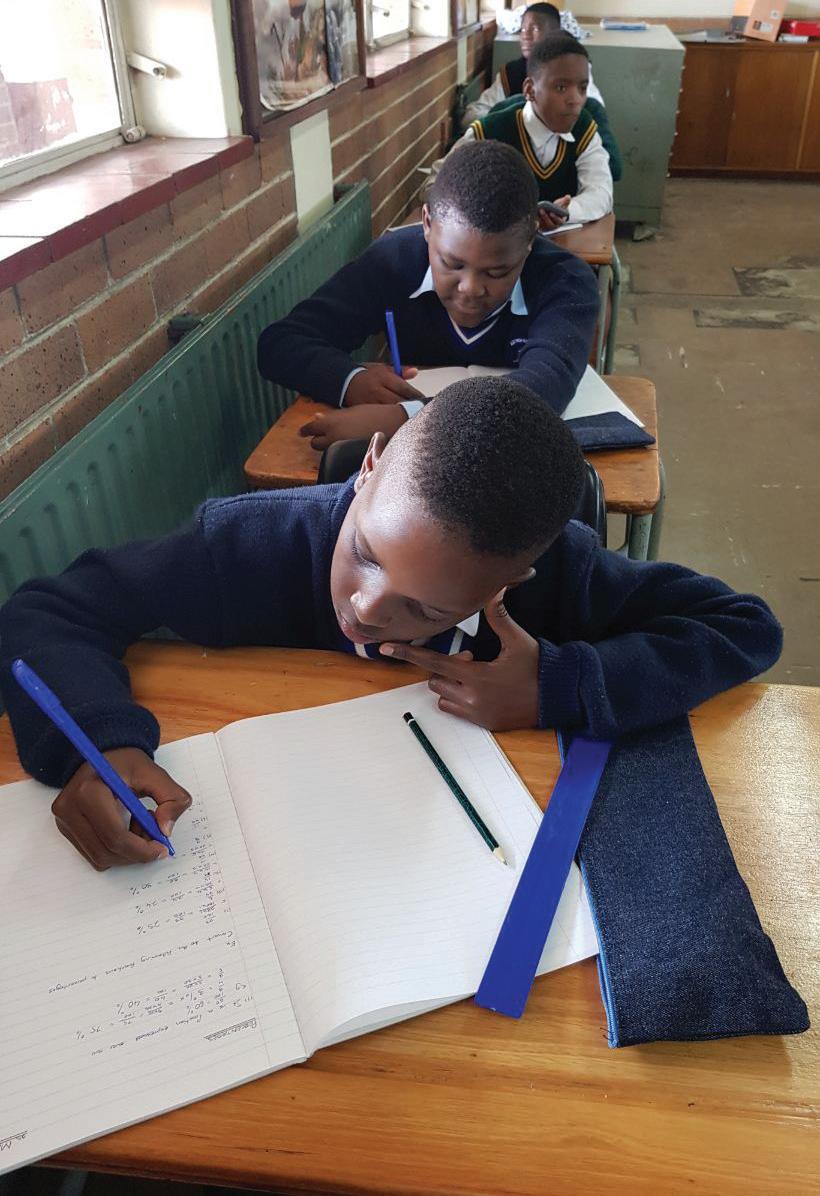
“In order for us to grow as a nation, it’s imperative that no child is left behind, regardless of their background or upbringing.”> Datatec Foundation Chairperson Maya Makanjee
When scrolling through educational or parenting sites, you’re likely to find yourself bombarded by a growth-mindset overload. It. Is. Everywhere! But what exactly is a growth mindset? And what’s the hype all about? Dalena van der Westhuizen, cognitive development specialist, master brain coach and co-founder and MD of BrainAbility, shares some insights
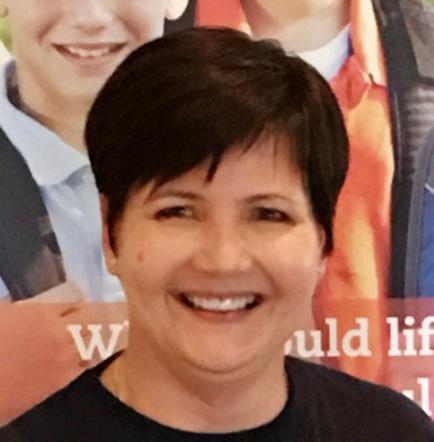
According to Stanford psychology professor Carol Dweck in her book Mindset: The New Psychology of Success (Ballantine), there are two kinds of people in this world: those with a “fixed” mindset and those with a “growth” mindset.

People with a growth mindset view intelligence, abilities and talents as learnable and capable of improvement through effort. On the other hand, someone with a fixed mindset views those same traits as inherently stable and unchangeable over time.
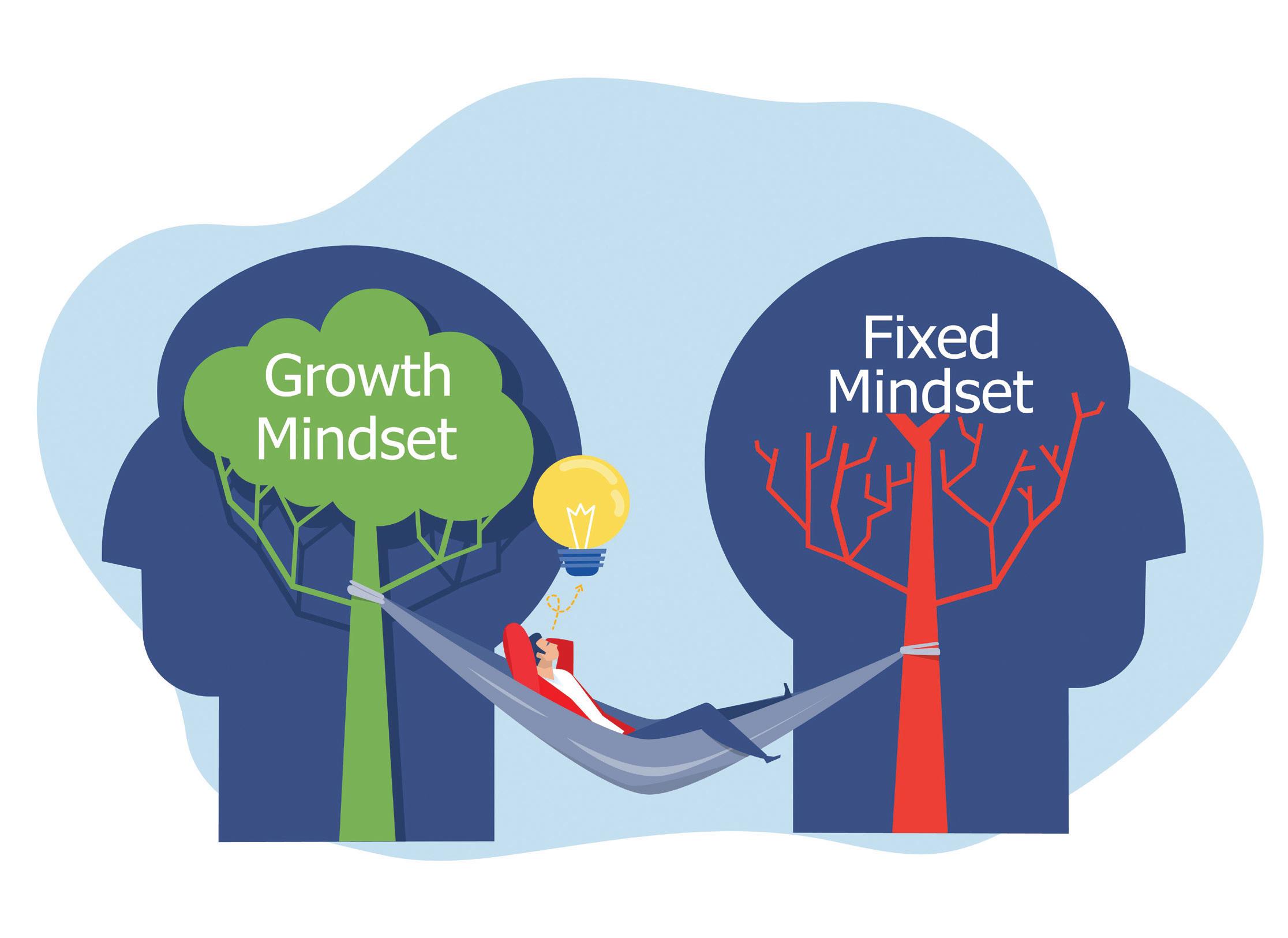
(Ballantine), there are two kinds of people in this world: those with a “fixed” mindset and growth” mindset
growth mindset view intelligence, abilities and talents as learnable and capable of through effort. On the other hand, someone with a fixed mindset views those same inherently stable and unchangeable over time.
Dweck (and many other growth mindset researchers and promoters), students with a believe and accept that academic achievement is due to their innate ability and not effort, while students with a growth mindset believe they can learn more or become work hard and persevere
Students who embrace a growth mindset are believed to learn more, do so more quickly and view challenges and failures as opportunities to improve their knowledge and skills.
their academic results and their mindset. For others, unfortunately, it doesn’t.
embrace a growth mindset are believed to learn more, do so more quickly and view failures as opportunities to improve their knowledge and skills.
growth mindset is believing that your brain can grow and you can improve your mindset is quite the opposite.
Simply put, a growth mindset is believing that your brain can grow and you can improve your abilities. A fixed mindset is quite the opposite.
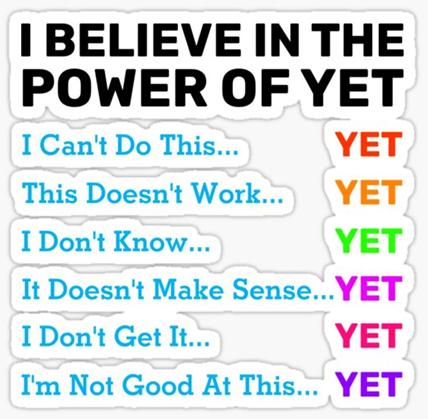
It all sounds wonderful and surely has merit. However, there are two problems I have with how growth mindset is often wrongly implemented.
Most children will start feeling demotivated if they try their best, but still do badly, fail a test or exam, or take hours to complete simple tasks.
risk that they’ll be demotivated by applying more effort – because “trying harder” often isn’t enough. Misdirected effort can be counterproductive in terms not only of the task, but of your child’s mindset and confidence.
So how do you implement a growth mindset? Here are six of the easiest and most practical ways to reinforce a growth mindset on a daily basis:
wonderful and surely has merit. However, there are two problems I have with how often wrongly implemented
posting or putting up posters about mindset isn’t the same as changing it.
your children to adopt a new mindset, changing to a more growth mindset friendly merely focusing on effort and completely forgetting about outcomes are unlikely to behaviours or improve effective learning.
Talking, social posting or putting up posters about mindset isn’t the same as changing it. Simply urging your children to adopt a new mindset, changing to a more growth mind set-friendly language or merely focusing on effort and completely forgetting about outcomes are unlikely to change behaviours or improve effective learning. This is because too often, all the effort goes into signposting the intention to change to a growth mindset, rather than addressing the practicalities of actually implementing and adopting one. Effort alone is often not enough. In my experience working with children from various backgrounds, ages and abilities, I’ve noticed that for some youngsters, putting in more effort indeed makes a difference to
Therefore, only focusing on effort and neglecting to dig deeper to find the reason for your child’s performance struggle/ frustrations is a big mistake. The only way to find a solution to a learning struggle or frustration is to discover the why behind it.
If a child never sees rewards from their efforts, there’s a significant

1. Introduce learning activities by explaining how they’re designed to benefit your child. For example, when you teach your children how to do a learn ing activity, tell them that talking about what they’ve learnt helps them own and process the infor mation better and grows more neural connections in the brain.
2. Use specific feedback and helpful vocabulary that guides your children to identify how they achieved success. We tend to give lots of positive feedback and praise when a child masters a
specific task/skill, but we don’t always point out the process followed in order to experience that success. Integrate growth mindset vocabulary into your daily routines and continually point out when your child demonstrates those qualities.
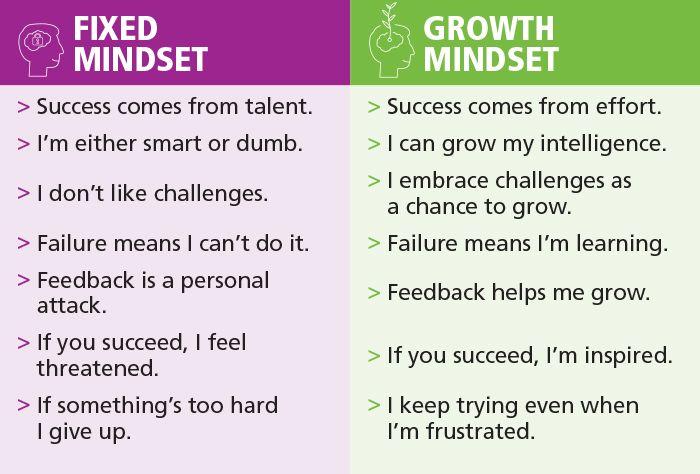
For instance: “This was hard for you, but you persevered and now you’ve almost got it!” or “You had a setback when your strategy didn’t work, but you found re sources to help you. You showed a lot of resilience and it paid off!”
3. Model a growth mindset so your children can see it in action on a daily basis. Show your children how to respond constructively to setbacks and failures. Let your children see how you brainstorm solutions and different strategies. Allow your children to see that you’re willing to learn and try new things, even when they’re hard for you. Let them see that learning new
challenges and failures as opportunities to improve their knowledge
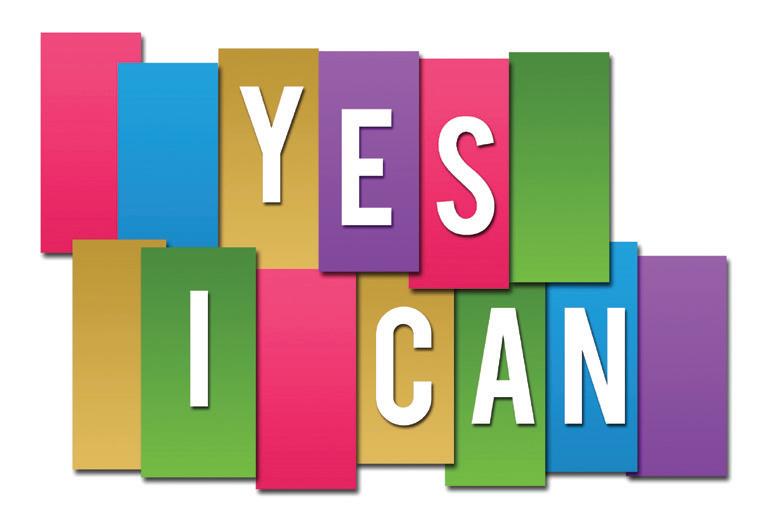
Simply put, a growth mindset is believing that your brain can abilities. A fixed mindset is quite the opposite.
things, taking on challenges and rebounding after making mistakes are all a natural part of life and help train your brain to grow stronger over time.
4. When your children make mistakes, respond in ways
It all sounds wonderful and surely has merit. However, there growth mindset is often wrongly implemented.
Talking, social posting or putting up posters about mindset
that help them rebound. When we overreact to mistakes or get frustrated with a child’s inability to internalise routines/procedures, we undermine our message that learning is a process and failure is a natural part of that process. Remind them: “Each time you practise this, your brain’s getting stronger and it will be easier for you to do it the next time.”
Simply urging your children to adopt a new mindset, changing language or merely focusing on effort and completely forgetting change behaviours or improve effective learning.
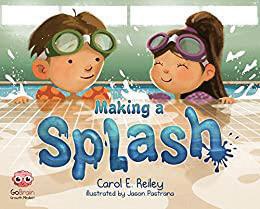
5. Teach your children about growth mindset/ neuroplasticity through these amazing books. Two of the best children’s books on growth mindset are Your Fantastic Elastic Brain by Dr JoAnn Deak (Little Pickle Press) and Making a Splash: A Growth Mindset Children’s Book by Carol E Reiley (Go Brain!).
6. Make growth mindset a habit, not an intervention. Remember, living a growth mindset is a marathon, not a sprint.
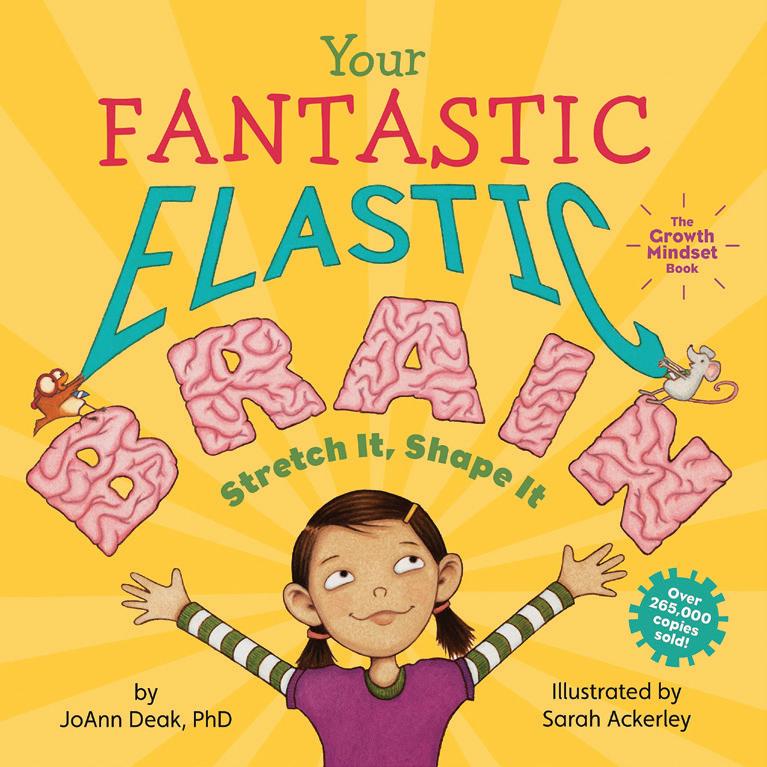
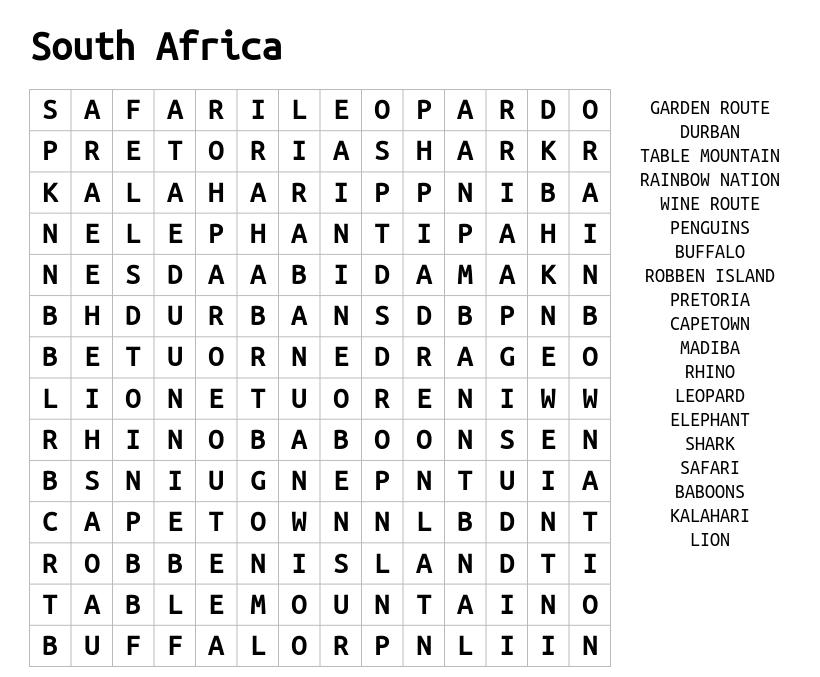


We’ve scrambled the names of 20 classic science fiction novels. Can you figure out the correct titles by unscrambling the letters?
EHT HSOEMLIDED NMA EDR RSAM ROLWSEF OFR ANLGENOR EHT FVORERE AWR ETH UNONIDFTOA LORTGIY DRILNORGW TEH SRATS MY OTTSNANIIED EHT MRNIATA NRHCSLCIOE TEH LTEF HADN OF ENSKSDAR A NAICLCET FRO EOBWLIIZT
RE'DSNE EMAG HTE MIET HMEICAN RNEEAUNRMOC ENTIENEN R-ETOYHGIUF HET SSSDSPEIDEOS UEEDNVSRZO IHTW RAAM SENRGATR NI A GSATNER DLAN HTE NMA IN HTE IHHG LECTAS HI'ODCDHSLO EDN HNIEORYP
© 2017 puzzles-to-print.com
We’ve scrambled the names of 20 classic science fiction novels. Can you figure out the correct titles by unscrambling the letters?
EHT HSOEMLIDED NMA
EDR RSAM ROLWSEF OFR ANLGENOR EHT FVORERE AWR ETH UNONIDFTOA LORTGIY DRILNORGW TEH SRATS MY OTTSNANIIED EHT MRNIATA NRHCSLCIOE TEH LTEF HADN OF ENSKSDAR A NAICLCET FRO EOBWLIIZT
RE'DSNE EMAG HTE MIET HMEICAN RNEEAUNRMOC ENTIENEN R-ETOYHGIUF
HET SSSDSPEIDEOS
UEEDNVSRZO IHTW RAAM SENRGATR NI A GSATNER DLAN HTE NMA IN HTE IHHG LECTAS HI'ODCDHSLO EDN HNIEORYP
© 2017 puzzles-to-print.com





BRAINABILITY www.brainability.co.za dalena@brainability.co.za 082 448 8221


www.digitutors.co.za admin@digitutors.co.za

BK PUBLISHING www.bkpublishing.co.za mail@bkpublishing.co.za 012 342 5347 082 560 6588

DT INTERNATIONAL ACADEMY www.danieteach.com info@danieteach.com

What we offer: EDUC8SA www.educ8sa.net info@educ8sa.net 084 685 2138
Preschool - Gr. 12 GED The American High School Diploma.
christine.evans@pearson.com

BOSTON www.bostononline.co.za Janine@boston.co.za 011 551 9111


EZ LEARN www.ezlearn.co.za barbara@ezlearn.co.za 082 322 0005
VALENTURE INSTITUTE www.valentureinstitute.com enquiries@valentureinstitute.com 021 207 3894
January 2023
WOEMA BOEKE www.woemaboeke.com info@woemaboeke.com 086 0995 100
Student accommodation in Cape Town
FEENSTRA GROUP www.feenstragroup.co.za sboniso@feenstragroup.co.za 012 472 9200





